Hrishikesh’s October 27, 1993 Letter to “My dear brothers and sisters”
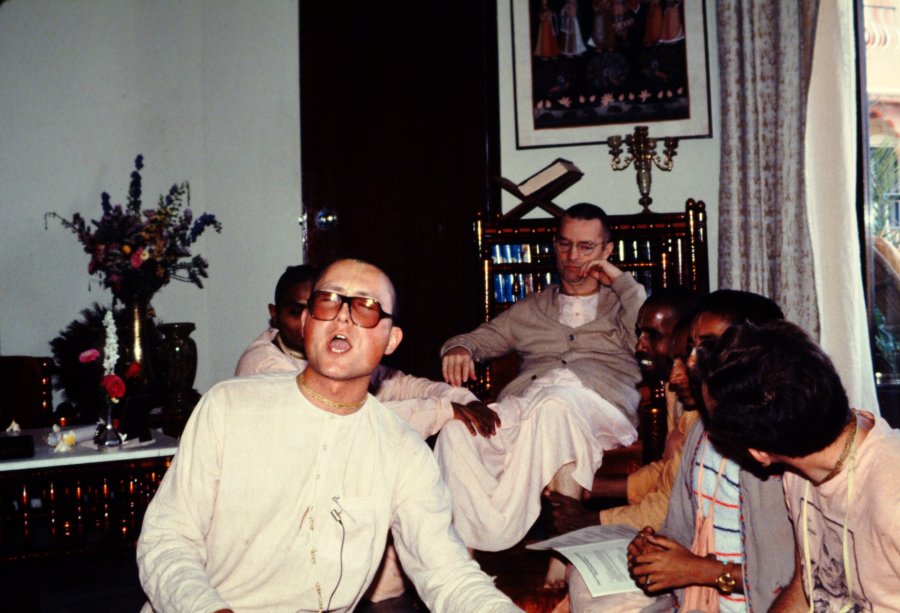
Hrishikesh dasa chants Hare Krishna and plays harmonium for Bhaktipada and disciples, while two Indian godbrothers massage Bhaktipada’s legs, in Bhaktipada’s personal suite in the Bombay Juhu Beach ISKCON Temple tower (March 1982)
October 27, 1993
My dear brothers and sisters,
Please allow me to reveal my mind to you. Revealing one’s mind in confidence, according to Srila Rupa Goswami, is one of the six exchanges of love between devotees, and, at this time, I believe all of Srila Bhaktipada’s followers need to have some honest loving exchanges.
Please forgive me if what I am about to say offends you. I am truly sorry if my words cause a disturbance, but I cannot remain silent any longer. Thank you for your patience and consideration.
I am greatly saddened by the unexpected turn of events which has taken place here at New Vrindaban beginning on Srila Bhaktipada’s appearance day celebration, September 6th, 1993. My heart has truly been broken.
For those of you who do not know me personally, please allow me to introduce myself so you can better know my background.
I am not a newcomer to New Vrindaban. In 1978, after graduating from college, I renounced a career in music to join New Vrindaban as a full-time inmate. Although I was attracted by the Krishna consciousness philosophy, the chanting, the vegetarianism, the simple living and high thinking, the life-style and the austerity, the primary reason I dropped everything immediately and became Bhakta Hank was the uncompromising preaching and fatherly affection I received from Srila Bhaktipada.
Although my association with him was limited for the first few years, I nevertheless felt a genuine love emanating from him which had a magical quality. It was intoxicating. All problems and difficulties that one experienced in life, however severe, routinely evaporated in his presence.
He inspired me to work hard. He expected the best from me and I gave him my best. I willingly gave my life as an offering for his pleasure only, as did many others including yourself. I was all too eager to surrender to a transparent via-medium to God, connected in the authorized disciplic succession of spiritual masters. He had the answers to life’s questions and his logical preaching and strict behavior reinforced our belief that he was a pure devotee, free from all trace of material desire and cent-per-cent surrendered to the Lord.
His classes and darshans were consistent and solidly based on Prabhupada’s teachings. He did not speculate or try to manufacture his own style of religion. He did not try to “improve” the method of self-realization that Prabhupada gave. He simply presented what Prabhupada taught without changing anything.
We all felt that we were in direct connection to Srila Prabhupada through Kirtanananda Swami. We felt secure in the knowledge that we were following an ancient and authorized process of yoga, a path which had been delineated by the Lord Himself and traversed by hundreds and thousands of saints and sages since time immemorial.
At this time in 1978, please remember, there was no simultaneous guru puja. There were no pranam prayers offered to Srila Bhaktipada—we called him Kirtanananda Swami or simply Maharaja. There was no pipe organ, there was no temple or guest lodge as we know it now—the temple was in the old farmhouse at Bahulaban. There was not even a Prabhupada’s Palace to speak of. The Palace was still a long way from completion and only a few devotees were working on it, which made progress slow.
In the beginning, I lived at the Vrindaban Farm with the other brahmacharis. I worked daily at the Palace, gold leafing, painting and designing. We were making an offering of love to Srila Prabhupada. Everything we did was for Srila Prabhupada. Srila Prabhupada was truly the center of the community and it was obvious in the words and activities of the devotees.
After some time, I requested initiation from Kirtanananda Swami. I told him that I wanted to spend the rest of my life at New Vrindaban. He exclaimed with a big smile, “Jaya! That’s what I like! Someone who comes and does not run away.” Maharaja awarded my new name in the fire sacrifice on Gaura Purnima in March 1979, along with Damodar, Jaya Sri Krishna and a dozen others.
After the Palace had its grand opening on Prabhupada’s appearance day in August of 1979, I was asked to go out on sankirtan. I was told not to come back until I collected $5,000. My first sankirtan leader was Tapahpunja who taught me the basics of book distribution and getting donations for incense. We used to go out in the parking lots of Eastern Ohio with a book bag filled with Prabhupada’s paperback books and spiritual sky incense. Sometimes at special events we would pin flowers on people and sometimes at county fairs we would sell Krishna conscious rock music records by Mangalananda.
This was a terrible time for me, because I was not good at sankirtan. It was difficult for me to approach strangers, not to mention asking for their money. I would collect at maximum twenty or thirty dollars a day while my sankirtan buddies would be collecting $150 or even $200 daily. Sometimes I would sit in the van frozen to the seat, petrified with fear, as my more advanced godbrothers—Damodar and Jagannatha Misra—jumped out of the van into a parking lot like experienced paratroopers jumping out of an airplane. Life was hell for me! I was totally miserable!
After a few months of intense suffering, I came back to New Vrindaban for a festival and Srila Bhaktipada spoke to me.
SB: How are you doing on sankirtan?
HK: I’m afraid that I'm not very good at it. I’m a failure!
SB: Don’t worry, I was never very good at it either! That’s why I'm here at New Vrindaban instead of out on the road. Would you like to move back here and be a teacher for the boys at the gurukula?
I remained silent for some time and considered his proposal. The headmaster, Sri Galim, had already approached me and asked me to write a musical play based on Krishna’s pastimes for the children. I had already written one song, called Vrindaban Is Such a Nice Place. This would be a service in which I could truly make a nice contribution to the community. I was certainly not making any significant contribution by staying out and frying out on sankirtan.
I was just about to accept his offer when I remembered his classes and darshans where he said that sankirtan was the highest service, sankirtan was the best way to please him. Didn’t I want the highest? Didn’t I want to sacrifice my life for Krishna? Didn’t I want to surrender everything?
HK: I’ll stay out on sankirtan, Maharaja.
SB: Jaya, Hrishikesh!
I remained on full-time sankirtan until September 1985 when Bhaktipada asked me to start his book publishing/marketing company which we named Palace Publishing. Song of God had come out earlier that year and Christ and Krishna was being printed. In February of 1986 Bhaktipada asked me to travel to the quintcentennial celebration of Lord Chaitanya’s appearance day in Mayapur India, to sell his books, which now included Hayagriva’s Dialectical Spiritualism. There I sometimes had to defend Srila Bhaktipada against various devotees from other temples who were not so favorably inclined toward him. Shortly after returning to New Vrindaban, I married Mahaprabhu’s daughter, Shyama dasi.
In October of 1986, Srila Bhaktipada asked me to develop an ambitious music program of choir, organ & orchestra for the worship services at the temple. I worked with him closely for many years in this service, adapting the traditional Sanskrit and Bengali songs to English in the Western style and training singers and musicians. I created a new liturgy which brought me many compliments and also many criticisms. Srila Bhaktipada was apparently pleased with my service, for he wrote in his book How to Love God, “I think the vision [that Krishna] has given me in regard to preaching with music is best understood by Hrishikesh.”
However, beginning in 1987, little by little, I began to see and hear things which made me begin to have my doubts about Srila Bhaktipada’s character and his vision for spreading Krishna consciousness. I began to think that lying to people in order to collect money for Krishna may not be the best way to serve Krishna. I began to think, what is the use of expending so much time and energy in building a gargantuan Cathedral at New Vrindaban if Prabhupada’s Palace of Gold was falling apart? In addition, what use is a City of God if the residents were fighting and bickering among each other? How would this be any different than any other city? I remember one darshan with Srila Bhaktipada when he thundered, “There will be NO householders in the City of God! Only brahmacharis and sannyasis. The householders will have to live outside the city wall.” I began to think: Maybe I’d better find another spiritual community to live in.
I revealed my mind on several occasions to Bhaktipada, but he could not always dispel my doubts about his vision. Nonetheless, I never doubted his purity and therefore continued to serve him faithfully, accepting the apparent paradoxes as inconceivable to my limited mind.
I remember the evolutionary experimental phases that we went through under Bhaktipada’s direction. For some time we were chanting japa on clickers, then on small beads, then we were chanting in English, “Lord Krishna, have mercy on a sinner like me and grant me your service eternally.” Then we were chanting again in Sanskrit.
After some time we began chanting silently at the noon service. Then all of our japa was silent. I remember one silent chanting service in the temple. I was sitting at the organ, which, at that time, was located in the front of the temple next to Lord Nrsimha’s altar. We had been meditating for some time when I heard a snore coming from the loudspeakers. I opened my eyes and looked around. Then I heard another snore, and another, and another. I looked to see where the microphones in the temple were located. There was only one microphone close enough to a person to pick up snoring and it was right in front of Srila Bhaktipada’s nose. His eyes were closed and his chin rested on his chest. I looked around the room. Everyone’s eyes were closed except for Nityodita Swami. Our eyes met and we nodded toward Bhaktipada and smiled. After less than a minute, the snoring stopped and Srila Bhaktipada raised his head, opened his eyes and whispered, “Krissssssshhhhhhh - naaaaa!”
I talked to Nityo soon afterwards, “Did you see and hear what I did?” He said, “Yes, but you must remember that Bhaktipada’s sleeping is not like your sleeping!” When I talked to Bhaktipada about it later, he vehemently denied falling asleep.
After some time, we didn’t have to chant 16 rounds anymore, just an hour-and-a-half daily. Bhaktipada claimed to chant 64 rounds a day, but when I traveled with him to New York, I did not think that he was actually chanting that much.
I was also not impressed by the results of our experiment with our interfaith residents. Many of them claimed that Bhaktipada had lied to them and cheated them. One of them left fearful for his life.
Bhaktipada advocated a raw food diet, but regularly ate lasagna. During one darshan at his house I heard Bhaktipada claim that in five minutes he could find enough wild plants growing in the woods behind his house to live on for an entire day. But as a former Eagle Scout, I had studied and collected edible plants and knew that he was making a gross exaggeration. The “No Salt” fad diet was another “improvement” that he recommended for his devotees. Recently Bhaktipada sent Gaurasakti to Central America to look for a tropical island for sale. Apparently he has enough money to buy a million-dollar island, but not enough money to purchase feed for starving cows.
Several years ago, I read in Prabhupada’s letters that Bhaktipada one time had blooped from ISKCON. I asked him about this. He smiled with embarrassment and said, “I was in Maya.” I accepted his explanation and never brought it up again.
I also asked him about allegations of sexual contact with Chaitanya Mangala. He replied, “I was incapacitated at the time. I could hardly walk or talk. Such accusations are preposterous.” I accepted his explanation.
Then on the day after his appearance day, Tuesday September 7, 1993, when questioned in private about recent allegations of apparently-erotic behavior—extended hugging and embracing with a male disciple in the bed of his Winnebago van one night—Bhaktipada asked the leaders of the community to decide on a course of action he should take for his rectification. But the next day he retracted his confession and claimed to be innocent, a statement which caused much confusion and confrontation among devotees. He came to the temple for an istagosthi where it was expected that he would explain everything for everyone’s satisfaction. He began by reading a commentary on the verse in the Bhagavad-gita where Krishna says, “Even if my devotee commits actions abominable, he is still to be considered saintly.” Then he told the story about Parasara Muni who became afflicted with lusty desires while crossing the Ganges and seduced the woman who was steering the boat. From this union the great sage Vyasadeva was born. Bhaktipada concluded that even if a great soul seems to act in an improper way according to material vision, we should understand that it is simply a part of Krishna’s lila.
Then he asked for questions. I won’t go into details, but he did not answer the questions that were asked of him. He evaded them, he denied them, he attacked the character of the persons asking them, he exhibited great expertise in the art of word jugglery, etc., but he did not answer the questions.
I had a very strong feeling that Bhaktipada had indeed committed some transgression. It was obvious to me. For years, whenever I had seen him accused of some wrongdoing, he had immediately denounced the demons and waved the flag of innocence. Bhaktipada was always very outspoken about his innocence, especially regarding the court case. But for 30 minutes in the darshan, he did not mention that he was innocent. He neither acknowledged nor denied the accusations.
After some time, disappointed by his evasiveness, I raised my hand and said, “Bhaktipada, you know that I have great affection for you despite the fact that I have not always exhibited this affection by surrender. You should know that your disciples are in great confusion. We need to know, once and for all, if you are guilty or innocent of the alleged charges.”
Bhaktipada began responding, but he still did not answer the question. Finally, I demanded, “No. You must answer the question. There is great doubt in the minds of your disciples and you must kill these demons of doubt.”
There was a moment of silence, then Bhaktipada smiled and said, “Innocent!”
A roar of applause erupted from the front of the room from the disciples who were sitting at Srila Bhaktipada’s feet, while tears glided down the faces of the other devotees in the temple. Some people left the room crying. Shortly afterwards, Bhaktipada departed, followed by a cheering crowd of well wishers.
I was shocked and hurt by his denial, but I decided to wait patiently and let Krishna take care of everything. However, I couldn’t forget it. Many times I had gone to the temple for the morning service, opened the door and peeked in, saw Bhaktipada sitting on the vyasasana, closed the door and walked up to the Palace for the alternate mangala aroti. It was unbearable to see him accepting worship like that.
After three weeks, still apparently nothing had been done to correct the situation. I called Adwaita, the chairman of the board that Bhaktipada had asked to draw up a proposal regarding his resignation from the management of the community. Adwaita said that work was progressing, but slowly. Nityo Swami told me that, since Bhaktipada’s confession, the residents of New Vrindaban had become the laughing stock of ISKCON. “Just see how blind those devotees are!” his godbrothers chided. “They are still worshipping him, despite his admission of sexual improprieties.”
I had a discussion with Kripamaya Prabhu and he chastised me for accepting second- and third-hand information. “You should hear only from the horse’s mouth!” he said. I took his instruction to heart, called Chaitanya Mangala in California and asked him exactly what happened between him and Bhaktipada while he was his personal servant in the early part of 1986. His answer surprised, me: “I was Bhaktipada’s personal servant for over a year after he got out of the hospital. In mid-January, I noticed what I thought were sexual advances toward me. At first I thought they were accidental, but as they continued, I began to have my doubts.
“This really made me confused, because I had been taught that if a disciple thinks bad thoughts about his spiritual master, he should either put the thoughts out of his mind or, if he cannot do this, then he should kill himself. I was really in great mental anguish. I thought I was going to hell for thinking those things. I suffered a lot.
“Then I decided that I must make a test to see if my suspicions were true or not. The next time he made sexual advances, I went along with him and did not resist. Before long, he had me on the bed.” [Dear reader: the graphic details of what happened next is not something I want to include in this letter for obvious reasons.]
Chaitanya continued, “When I was convinced that I was not imagining this, that Bhaktipada was indeed performing sexual activities to me, I got off of the bed and stepped away. Bhaktipada exclaimed sarcastically, ‘Oh! You're SO advanced!’”
At this point in our phone conversation, I questioned Chaitanya: “But Bhaktipada told me personally that this was alleged to have happened soon after he returned from the hospital. He said he could hardly walk or talk. He was practically an invalid.”
Chaitanya said: “Remember that Bhaktipada was released from the hospital in November 1985. This happened two months later in mid-January. Not only was he walking and talking when this happened, but he was driving his vehicle around the farm.”
Then I said, “But Bhaktipada has told others that he has no memory of this incident taking place. His memory was damaged by his brain injury.”
Chaitanya: “It is true that he does have memory problems, but he certainly remembered it after it happened, because he wouldn’t let me out of his sight for a year! I could hardly speak privately with anyone for the longest time.”
This jogged my memory and I recalled a time in Srila Bhaktipada’s house when I witnessed Chaitanya’s father and sister begging him to come home for dinner with them for just a few hours. Srila Bhaktipada grabbed Chaitanya's arm and said, "I'm sorry, but I need him. He's my nurse. I need his constant attention." Chaitanya concluded, "In fact, Srila Bhaktipada tried to bribe me by marrying me to a millionaire's daughter." [Nathji's daughter, Vrinda Priya]
But Srila Bhaktipada had already made explicit confessions to several persons. He had told Radhanath Swami and Devamrita Swami, “I felt like Arjuna felt when Krishna left him—defeated by a couple of cowherd boys.” He had told Lilasukha that he had “done things he should not have done.” He had told Krishna Truthful that he “got a little carried away.” He had told Strong Faith and Ramananda that he had “a problem with attraction for young men.” He had told Nathji and Ranchor in the presence of PK Swami, Bhaktirasa Swami and Sudhanu, that he had been a practicing homosexual up to the day he met Srila Prabhupada, after which he gave it up completely. But since his head injury in 1985, he has had a problem with recurring sex desire. He told the devotees present: “Once an alcoholic, always an alcoholic.” He requested that senior men take turns staying with him 24 hours daily to help him avoid temptation.
But despite his private confessions, Bhaktipada was still sitting on the vyasasana accepting worship. By this act, more than anything else, he was splitting the community. Even a mundane politician has the common sense to resign from his political post when illicit sexual behavior is made public. Fondling young men’s private parts is not a respectable activity even according to the degraded contemporary American standard.
I decided that someone must approach Bhaktipada immediately with great candor to try to help him. Over three weeks had gone by since he retracted his confession. He was losing his credibility fast. Every passing day destroyed his disciples’ faith in him more and more. I intuitively realized that a humble submissive approach would not help him, so I decided to try a forceful presentation. I wrote down my heartfelt feelings about the matter and traveled to Silent Mountain to visit him.
I requested a private darshan and began, “Srila Bhaktipada, I think I have a very deep love for you in my heart, although I do not always show it. I would like to reveal my mind to you, but first I must ask you a question.
“There is a great naval commander who is the captain of a battleship. He is the most respected man in the entire Navy. He has just finished an especially difficult battle in which he was wounded by the enemy. He tells the navigator to set sail to port by a particular route. The captain retires to his quarters.
“The captain has two sons who are second in command. The sons meet in the control room to read the charts of the ocean. They are stunned to see that the course the captain has set is fraught with great danger. The route is full of sharp jutting rocks, whirlpools, shallow waters, icebergs, fog, many shipwrecks, sea serpents and frequent storms. It is unlikely that they will reach their desired destination if they follow this course.
“However, the sons see an alternate route to the port, a route which has been recommended by all previous naval commanders, a safe route with deep water, favorable winds and good visibility. One of the sons exclaims: I must immediately tell the captain that he has made a mistake and we should change course before it is too late!
“The second son counters: No! You should not do this. The captain is an experienced naval commander, the most respected in the entire fleet. Surely he knows of the dangers and he probably knows a way to get through them safely. You should not question him. Besides, we don’t want to disturb the morale of the crew.”
Then I asked Bhaktipada, “Which of the two sons is better?” Bhaktipada replied, “They are both perfect, because whatever each offers the father, is offered with love.”
I said, “Then please accept with love this offering of a contrary opinion.” Then I gave him the following letter and remained sitting at his feet while he read the entire contents.
September 30, 1993
Dear Srila Bhaktipada,
Please accept my humble obeisances. All glories to Srila Prabhupada.
Please forgive me for not revealing my mind sooner, but it takes courage to say what I am about to say and I did not have sufficient clearness of mind or strength of character until now.
You know that I have great affection and love for you, although I may not always express it. I have served you since 1978 to the best of my ability, through thick and think, however faulty my attempts have been.
I joined New Vrindaban in 1978 and helped you to build Prabhupada’s Palace. For several months during the summer of 1979 I slept only 5 hours daily in order to finish the gold leaf designs on the domes before the grand opening. After the Palace was completed, I was asked to be a fulltime fundraiser and I performed great austerities to become your number one [men’s] collector. I was the innovator who helped invent and perfect the Citation Line which was a major factor in the advent of New Vrindaban’s Golden Age of Laksmi Collection in the mid-eighties.
After some time, you retired me to the dhama where I assisted you in creating a new liturgy in the Western style. I acted as your instrument and tried to be true to you, despite personal slanders against me for leading such a controversial musical program. In all that time I have never once left your service or spoken against you. I come before you as a loving son comes before his father.
I understand that you are experiencing difficulty. We all are. The embodied soul is always battered by the reactions of the three modes of material nature. We are eternally controlled by higher powers, whether by Krishna’s internal energy or his external energy.
However, in my fifteen years at New Vrindaban, I have never seen such low morale among residents. Factions have split your community. The most respected leader, Radhanath Swami, has left with a broken heart after you, in so many words, called him a liar and a conspirator. His only fault was obeying your direct orders. Others who cannot leave immediately have begun to form their own community with their own worship services.
Indeed, an exodus of hundreds of long-time New Vrindaban residents and supporters has been deserting you for years. They include not just householders, but respected sannyasis like Harikesh Swami, Bhakti Tirtha Swami, Satsvarupa Goswami, Varsana Swami and Umapati Swami.
Two weeks ago one of your most dedicated disciples threatened to kill poor godbrother Sarvabhauma for the sin of telling the truth about what he saw in the back of a Winnebago mobile home. What a mess we’re all in! This gives me great sadness.
And who is to blame for all of this?
You recently blamed Devamrita Swami for your recent troubles [Devamrita was the person who purportedly convinced Bhaktipada to change his story and claim complete innocence], but isn’t this a cowardly accusation? After all, King Kamsa may have been wrongly advised by his ministers to kill Devaki’s babies, but today no one even knows the names of Kamsa’s cabinet. We only remember the name of King Kamsa and his atrocious acts. Devamrita may have been your trusted adviser, but he was only telling you what you wanted to hear. He was your “Yes Man.”
It is no secret anymore about your attraction for young men. In retrospect, I wonder how I could have been so naive. Krishna gave me many warnings. Many years ago, Chaitanya, who helped nurse you back to health after your near-fatal head injury, personally came to me in great distress wanting to talk about your unusual behavior. I saw no concern for alarm. I though that since you were just returning from the brink of death, we should expect some strangeness.
Bhakti Stevie, the blond rock ’n’ roll guitarist, slept in the same room with you for many months and spoke to me several times about your unusually intimate affection for him. I saw no concern for alarm. I though you were just being extra-friendly.
Bhakta Paul, another blond boy who was also your personal servant for some time, accused you of attempting to seduce him. I saw no concern for alarm. I thought he must be lying.
But then Bhakta Dan made the same accusation last February. Then followed a report about an incident while you were visiting Malaysia. Then I recently learned that the teenager Kalki (Kardama) reported acts of misbehavior from you and later fled in fear for his life. Now comes the alleged incident in the back of your mobile home while returning from your trip to Chicago, which you claim is no cause for alarm.
But no, Bhaktipada, I am very alarmed. Nearly all of your followers are alarmed. Where there is smoke, there is fire.
A former interfaith resident of New Vrindaban candidly told me, “I thought it was common knowledge that Bhaktipada slept with young men! I was obvious that he had a preference for eighteen-year-old blond boys.” It was obvious to him because he is a homosexual himself. It takes one to know one.
You insist that a devotee, even if he commits actions abominable, is still to be considered saintly, but this is true only if he does not commit the sin again. You seem to be a chronic offender.
Strong Faith, bless his heart, came to your defense and said that in a moment of truthfulness, you confessed that you had a problem of attraction for young men, but you were quick to add that you never actually had sex with anyone. But is this how an acharya behaves? Suppose a heterosexual sannyasi laid in bed hugging and embracing an eighteen-year-old blond brahmacharini, but he reassured his disciples by saying, “I never went all the way.” Is he to be worshiped for his “self control?” A homosexual sannyasi should avoid the intimate association of young men with the same strictness that a heterosexual sannyasi avoids intimate association with young women.
You reveal your faults in private, but you deny them in public, despite the fact that a sannyasi is supposed to have no “private life.” A sannyasi’s life is meant to be an open book. He has nothing to hide. Although you are trying to hide many secrets, Krishna is revealing them little by little.
In On His Order you write about the “fallen” guru: “First the guru’s godbrothers begin to speak out or flee. As the rumors and accusations mount, the disciples think their guru’s godbrothers are envious snakes. Finally, the truth rears its ugly head, and everyone mourns piteously.” It seems to me that history repeats itself.
Jnana dasa, a former ISKCON devotee, visited New Vrindaban during your September 9th istagosthi and mentioned that your darshan was an almost exact repeat of an istagosthi that Bhagavan Maharaja had with his disciples. Jnana dasa knows. He was a disciple of Bhavananda Vishnupada. Then he took re-initiation from Bhagavan Maharaja and observed the same travesty again.
Jnana dasa explained the process, “First the spiritual master admits his faults in private. However, in public, he denies all guilt, but he decides that he will not initiate for some time.”
Jnana continued, “The next step is that the guru decides to step down from the position of spiritual master. The third step is that the GBC investigates, determines that he is rascal number one, and kicks him out.”
He concluded, “Srila Bhaktipada’s case is slightly different. There is no GBC to investigate and kick him out. He has made himself an authority subject to no one else.”
Please tell me, Srila Bhaktipada, if you are “innocent” as you claim to be, then why are you not initiating anymore? How are you going to show us that you will end up differently than Vishnupada or Bhagavan?
Srimad-bhagavatam (1.1.6) states: “No one should be allowed to sit on the vyasasana who is not spotless in character and free from vice.” Why do you continue to sit on the vyasasana in direct disobedience to scripture? Your sitting up there putting on a show reminds me of the story of the emperor’s new clothes. He was parading stark naked before the entire world, but no one said anything to him because they were afraid that the emperor would call them a fool. But I am not afraid to tell you the truth.
You said that your disciples should make public confessions, but you don’t. You insist on truthfulness, but you tell lies. You ask for unity, but you create chaos. The sign of a really great man is that he will admit when he has been wrong and seek forgiveness. Humility is the real quality of greatness. An acharya is supposed to teach by example, but your actions speak so loudly that we cannot hear the words you are saying.
You claim to be a disciple of Srila Prabhupada. In fact, you claimed to be Prabhupada’s BEST disciple, the ONLY disciple empowered to carry on the disciplic succession, because ISKCON, you claimed, was contaminated by corrupt deviants. I remember the glee you exhibited when you were finally excommunicated. But, Bhaktipada, if you claim to be such a great follower of Srila Prabhupada, then you must follow his orders. It came as a great eye-opener for us when we read Srila Prabhupada’s letters of chastisement to you for trying to institute in 1967 the changes which you instituted twenty years later: growing beard, wearing long hair, not wearing dhotis, minimizing Krishna’s personal aspect. Most of us were shocked to read Prabhupada’s strong condemnation.
Prabhupada begged, “This is very much disturbing to me and has caused me much pain. Please therefore stop Kirtanananda from making his mental concoctions. Do not be misled by him. . . . It is clear that Kirtanananda has not rightly understood Krishna conscious philosophy and it appears that he does not know the difference between impersonal and personal features of Krishna. The best thing will be to prohibit him to speak in any of our functions or meetings. It is clear that he has become crazy and he should once more be sent to Bellevue [mental hospital]. He was in Bellevue before and with great difficulty and with the help of Mr. Ginsberg we got him out. But it appears that he has developed his madness again, therefore if he is not sent to Bellevue then at least he should be stopped from speaking such nonsense.” (Letter from Prabhupada to Brahmananda 10.16.1967)
Lord Chaitanya, God himself, told Prakasananda Saraswati the story of his chastisement by his spiritual master, Ishvara Puri. “My spiritual master called me a fool and told me not to read Vedanta Sutra. He said just to chant the holy name of Krishna.” Lord Chaitanya did not say, “My gurudeva told me not to read Vedanta Sutra some 25 years ago, but now that he has disappeared, I am more intelligent and can study it.”
Lord Chaitanya was the greatest scholar during his time. As a mere boy, he defeated the champion of learning, Kesava Kashmiri. Of all men walking on the Earth, he was the most capable of commenting on Vedanta Sutra. Lord Chaitanya could have easily written such commentary to show the actual meaning of Vedanta Sutra for the benefit of the entire world. But he did not. He chose to humble himself before the order of his spiritual master to set an example for generations of spiritual masters and disciples to come.
Don’t get me wrong, Bhaktipada. I personally like the changes of de-Indianizing Krishna consciousness for preaching in the West. I love chanting in English with Western music. I love the robes. I love long hair. I love interfaith. But on the other hand, how can you expect your disciples to obey your instructions when you yourself do not obey the instructions that your spiritual master so furiously demanded? You are fond of saying, “My guru may be right, he may be wrong, but he’s always right!” By changing so many things, you are in essence saying that Prabhupada was wrong and you are right.
Even if you are right by making these changes, you are wrong because you disobeyed your spiritual master’s direct orders. Therefore, Krishna cannot be pleased.
I am not condemning you, Bhaktipada. Prabhupada forgave you for your offenses and I am eager to forgive you also, but you must give up hypocrisy and duplicity. If you had admitted your human frailties during that fateful istagosthi fiasco, your disciples would have respected you for you honesty and bonded together in love for you. But instead, you crushed any faith left in your more intelligent disciples, and created enmity and suspicion amongst the others.
Some say that Bhaktipada will not make a statement because he is afraid that his “fanatical” disciples will lose their faith. This is not true. I have talked personally with several of your “fanatical” disciples and presented this imaginary scenario: the guru enters the temple for mangala aroti, offers flowers to his spiritual master, but refuses to sit on the vyasasana and accept worship. The guru then confesses, “I am feeling some spiritual weakness right now and I want to rectify the situation by temporarily stepping down from the position of worshipable guru to increase my own humility. Please assist me in my decision. If you like, you may continue to worship me mentally in your hearts as you have always done, but right now I do not want you to worship me on the vyasasana. I do this to set the example for the world to show how an acharya must act when he has been wounded in the fight with Maya.”
Needless to say, all of your “fanatical” disciples said that they would support and love you even more for your honesty, as I would also, Bhaktipada.
Some say, “Bhaktipada is afraid of making a public statement because his prosecutors might use it as evidence in his forthcoming court case.” I say: What is the value of a long life wasted by untruthfulness? Better one moment of honesty. What is the value of your precious freedom if your own disciples despise you and spit upon you behind your back? Better to live the rest of your life behind bars rather than betray your integrity. A sannyasi is supposed to be fearless. Don’t act like a coward. Socrates drank poison rather than compromise and that is why his writings are still studied today. Jesus Christ willingly accept crucifixion in witness to the truth.
B. R. Sridhar Swami says that a guru falls down for three reasons: money, women and fame. He writes, “The first thing is deviation from the higher gurus. That is pride. Then, he will show more tendency to amass money and not to spend it. The third sign is attraction to sex life.”
He continues, “In the beginning, we may neglect some occasional problems; some instances of these kinds of deviations may be ignored. But if we find that they are becoming more prevalent, then we must inspect the situation carefully. When we find that what appeared to us first in a small way is real, injurious, and of a big magnitude, and that our spiritual master is going down, then we must act to save ourselves. And we must also try to save others who might fall prey to the same exploitation as us.”
I request you to fall at the feet of your godbrothers and beg their forgiveness. Ask for some penance to atone for your offenses. Surrender to their instructions. You should beg them to allow you again to enter into Prabhupada’s ISKCON preaching mission. ISKCON may not be perfect, but then again, neither are you. You have showed us what happens when a sheep, however great it thinks itself to be, leaves the flock. It is eaten by the wolves of Maya. Prabhupada said it is easy to break a stick when it is separated from the stack.
You forced your godbrothers to kick you out of ISKCON years ago. You tried to establish yourself as a god unto yourself. But Krishna does not tolerate false gods today anymore than he tolerated Paundraka 5,000 years ago. He is smashing you and will continue to smash you more and more until you surrender. Please reform before it is too late. We love you very much and find it painful to see you in this condition.
According to Alcoholics Anonymous, a drunkard can never be cured unless he recognizes that he has a problem. I beg you to recognize your problem and take action immediately.
You are fond of telling Jesus’ parable of the prodigal son. The result was glorious because the son admitted his mistake and returned to his father. You will be glorified also if you admit your mistakes and return to your father’s family.
It is time for you to come out of the closet by your own volition, before Krishna drags you out unwillingly. I have faith that Krishna will direct you to do the right thing, Bhaktipada. He is guiding me. He is guiding all of us. However, until you take immediate steps to rectify yourself, I cannot support your mission. I cannot bear to see you in the temple accepting worship, contrary to the authoritative instructions of guru, sadhu and sastra. I cannot be true to my own conscience and put on a show of “Jaya, Bhaktipada! Everything’s alright!” Truth is more valuable than anything else. It is better to be a sex monger, a drunkard, a meat eater, and a gambler if one is honest about one’s faults, than to be a sannyasi who is a liar.
“There is nothing more sinful than untruthfulness. Because of this, Mother Earth once said, ‘I can bear any heavy thing except a person who is a liar.’” Srimad-bhagavatam 8.20.4
Please forgive me for my strong words, Bhaktipada, but blowing on a boil will not help. Only a sharp knife can cut it and let the pus out. You never minced words when you spoke, and I am trying to follow in those glorious footsteps. There are those who say I will certainly go to hell for speaking so critically to such a dear disciple of Srila Prabhupada. I agree. You have performed more service to Krishna than I could hope to do in hundreds of lifetimes. My character is questionable since I am a sinful person with many material desires. However, I am prepared to go to hell for the service of the Truth. We just want the truth. Please be truthful, Bhaktipada. We want you to tell the truth.
The words “truth” and “trust” are very similar. Only a couple letters change the meaning between the two words. Trust cannot manifest without first truth. Love cannot manifest without first trust. I still love you, Bhaktipada, otherwise I would not be taking such a risk in writing his letter. Look what happened to Sulochan. But this love cannot endure unless I trust you. It may already be too late to repair the damage you have done by lying. You have crushed my faith in you. Others, who may still profess loyalty to you at this time, will eventually discover the truth as I have. This will break their hearts also, just as it has broken mine.
However, I am confident that all will work out for the best. Thank you, Srila Bhaktipada, for everything you have given me. I will never forget your guidance and fatherly love of many years and for this I am eternally grateful. We are all praying for you.
Sincerely,
Hrishikesh dasa
[End of letter] While Bhaktipada was reading I was constantly praying to Prabhupada, ”Please speak through me. Let me be your instrument.” As soon as Bhaktipada was finished reading, he looked at me and joked, “Did your wife write this?” Apparently he did not believe that I wrote it. I replied, “My wife could not possibly write such a letter, and even if she could, she would not dare send it to you.
“No, I wrote every word myself, and then I showed it to a few devotees who I thought were mature. Each one said: I wish I could be so honest with Bhaktipada.”
SB: “I never said that people should not be honest with me!”
HD: “I know that, but for some reason or other, many devotees are afraid to reveal their doubts about your character to you.”
Bhaktipada exclaimed: “But I haven’t done anything wrong!” I replied, “Even if you haven’t done anything wrong, your behavior is so questionable that you should still step down to set an example to show how a guru should act when caught in a compromising position. His character must be above suspicion. Mother Sita was the most chaste wife, yet Lord Rama banished her from his kingdom because of the doubts of a Sudra. Lord Chaitanya banished the brahmachari Chota Haridas because of a slight offense.”
SB: “What did I do to make the GBC kick me out of ISKCON? They should have kicked me off the GBC, instead of excommunicating me!”
HD: “You did not cooperate with your godbrothers. [There is a long history of this, which I will not get into. However, let it be known that when Bhaktipada was in Bombay, Nathji personally telephoned him and begged him to come to the meetings at Mayapur to defend himself, but Bhaktipada refused.]
[Conversation continued:] HD: “Bhaktipada, do you realize what distress you are causing at New Vrindaban? Someone has taken your picture off of the wall in the temple. People are very angry. Devotees in India have threatened to take your picture off of the vyasasana if you do not reply to Nathji’s questions within a week.” [Nathji asked Bhaktipada two questions: 1) Why did you not step down seven years ago when you first experienced difficulty controlling sex desire, and 2) Why have you not stepped down yet? FAX dated 9/26/93]
HD: “Already the devotees in the temple are singing the prayers in Sanskrit again. People don’t respect you like they used to. Your changes were a great experiment, and I loved every minute of it, Bhaktipada! but they failed! And do you know why? What name did Prabhupada give to our community? He did not call it New Westminster Abbey, or New Vatican City, places where God is worshiped in great awe, reverence, majesty and glory as the King of Kings with fanfares with pipe organ, trumpets and kettledrums. No. He named it New Vrindaban, a place where God is not even worshiped as God, but as a little boy, a friend, a child, a lover. And the worship music of the Vaishnavas reflects this conception of God. It is intimate. It is simple. It is spontaneous. The Western classical style works great for the Christian conception of God. That’s why it evolved that way during the course of two thousand years. Similarly the Vaishnava form of worship has developed according to their conception of God.
“You should come to the temple tomorrow morning, offer flowers to Prabhupada and sit in your chair, not your vyasasana. You can make a simple statement that you are feeling some spiritual weakness right now and want to temporarily step down from the position of guru to rectify the situation.
“Then you should travel and preach, as Nathji recommends in his letter. If a sannyasi or brahmachari has some difficulty with sex desire, the standard remedy is for him to go out on traveling sankirtan. A rolling stone gathers no moss. I will be happy to drive you anywhere you want to go. I suggest you spend a week with Satsvarupa Goswami. Then we can spend a week with Bhakti Tirtha Swami. You have many godbrothers who would be happy to give you their association.
“And you need their association! You need their help. You cannot conquer this alone. Just get away from here for a while, at least until your trial. New Vrindaban devotees can take care of themselves. Visit your godbrothers in ISKCON. It will be good for you, it will be good for your devotees, it will be good for ISKCON. It will be good for the entire world.
“But you better act fast, before devotees begin investigating your activities with a magnifying glass. Your disciples are becoming very curious now. They are asking, ‘What did Bhaktipada do?’ If you were honest during your September 8th istagosthi and admitted to some weakness and stepped down immediately, your disciples would not care to know the details about your weakness.
“Devotees are not fault finders. We are not flies that search for stool. We are quick to overlook faults. But when you confess to some, and deny to others, and then confess again to some, and deny again to others, people start to wonder what really happened. Your disciples are investigating now. I personally called up Chaitanya Mangala. I called this person. I called that person. We just want to know the truth.”
I concluded, “The solution is very simple, but there is one problem: the solution requires great humility. But you’re too proud.”
At this time we were both silent. I had said all that I wanted to say and Bhaktipada also had said all that he wanted to say. He quietly said, “Thank you,” and I responded, “Thank you, Bhaktipada.” I left the room, exhausted but feeling very optimistic. I felt that we had successfully connected. The discussion was meaningful.
The next morning, Bhaktipada did not come to the temple for the morning service. He did not come the next day, nor the next day. He still has not come to the temple for the morning service since the day I spoke to him. After my meeting with him, Bhaktipada wrote the following letter:
Camp: New Vrindaban, Sept. 30, 1993
TO ALL DEVOTEES
Be it hereby known that I am Krishna’s servant; always have been, and always will be. For the past two decades I have been your acharya, teaching you how to surrender to Krishna. Now Krishna is turning the screws. Specifically, he wants to teach us all how to chant the holy name offenselessly, and that requires great humility. Lord Chaitanya says, “In a humble state of mind one can chant constantly.” Again, I want to be your acharya. I want to teach humility by eagerly accepting humiliation.
Since 1985, due to my past false pride, thinking that I was the builder of New Vrindaban, Krishna has arranged for me to be attacked physically and spiritually, and now practically pushed out completely by him. But I know the remedy, and I am determined to take it. Therefore, for the foreseeable future I request a leave as your worshipable acharya in order to increase my humility. I ask all my disciples to help me in this decision, and sincerely cooperate with your godbrothers and godsisters as well as mine. If you like, you may continue to worship me mentally, or in your heart, but not, for now, on the vyasasana. I do this to set an example for the world as to how an acharya must act when he is being attacked by Maya. I’m not down yet, and don’t expect to be. Furthermore, in the end, I expect to see a glorious victory that will make us all proud children of Srila Prabhupada and Lord Krishna.
In the meantime, I will pursue my sadhana and service at Silent Mountain in seclusion, as well as travel and preach as opportunity provides.
For Krishna’s service,
K. S. Bhaktipada
[End of letter] RVC Swami read the letter at the morning service and took Srila Bhaktipada’s picture off of the vyasasana. I was very encouraged by this and I thought that Bhaktipada was indeed sorry for his offenses and eager to rectify himself. At this time I had not discussed my conversation with Bhaktipada with anyone. As far as I was concerned, what happened in Bhaktipada’s house at Silent Mountain was between me and him. I planned to tell no one about it.
However, the next morning the picture was back on the vyasasana, “with Bhaktipada’s permission.” PK Swami told me, “If there is no picture it implies that the disciplic succession has ended.” What nonsense! Are we the only followers of Lord Chaitanya? One branch may break off the tree, but sincere disciples can easily jump off the falling branch onto another living branch.
The picture came off the next day, but it was soon back on again. The following day there was a beautifully-lettered and framed poster on the vyasasana with the words: “If you like, you may continue to worship me mentally, or in your heart. . . . Srila Bhaktipada.” After a few hours, the picture was gone with only the sign. Then a couple days later the sign was gone and the picture was back. As of today, the picture is still on the vyasasana.
Bhaktipada often said, “Pride goeth before the fall.” Bhaktipada commented on this topic once during a darshan: "Question: Can you say something about a devotee who is proud of his spiritual realization?"
SB: “These are contradictory statements. A devotee who is proud cannot have spiritual realization." City of God Examiner 2.14.1990.
The day after the letter of resignation was released, Srila Bhaktipada gave an istagosthi in the temple. Among other things, he said, "I have been asked why did I write that I have been your acharya for two decades when Srila Prabhupada was the only acharya twenty years ago. I ask, what does the word acharya mean? It means 'one who teaches by example.' Therefore I have been acharya not only for two decades, but for three decades! All this time I've been teaching by example how to surrender to Krishna! In fact, everyone is teaching by example whether they know it or not. I am acharya. You are acharya. Everyone is acharya."
But where does Srila Prabhupada write this in his books? Prabhupada uses the word acharya only in connection with the greatest spiritual masters, Ramanujacharya, Madhvacharaya, etc. He never says that a common devotee is an acharya. No. Here are some examples of Prabhupada's definition of the acharya:
“an acharya is defined as one who knows the import of all Vedic literature, explains the purpose of the Vedas, abides by their rules and regulations, and teaches his disciples to act in the same way.” CC Adi 1.46
“A guru is called also an acharya, or a person who has personally assimilated all the essence of sastras and has helped his disciples to adopt the ways.” SB 1.7.43
“Artha-jna brahmana refers to one who has made a thorough analytical study of the Absolute Truth and who knows that the Absolute Truth is realized in three different phases, name Brahman, Paramatma and Bhagavan. If someone not only has this knowledge but is able to clear all doubts if questioned about the Absolute Truth, he is considered better. Further, there may be a learned brahmana Vaishnava who can explain clearly and eradicate all doubts, but if he does not follow the Vaishnava principles, then he is not situated on a higher level. One must be able to clear all doubts and simultaneously be situated in the brahminical characteristics. Such a person, who knows the purpose of the Vedic injunctions, who can employ the principles laid down in the Vedic literatures and who teaches his disciples in that way, is called an acharya.” SB 3.29.32
“Lord Chaitanya says that a teacher should behave properly even before he begins teaching. One who teaches in that way is called acharya, or the ideal teacher.” BG 3.21
“After a devotee engages in the processes of sravanama kirtanam vishno smaranam pada sevanam arcanam vandanam dasyam and is able to secure these processes, he can later become a devotee capable of rendering spontaneous devotional service—namely sakhyam and atmanivedanam. Generally the great acharyas who preach devotional service all over the world belong to the category of sakhyam atma nivedanam.” SB 4.28.30
“A goswami, or the bona fide representative of Sri Vyasadeva, must be free from all kinds of vices. The four major vices of Kali-Yuga are 1) illicit connection with women, 2) animal slaughter, 3) intoxication, 4) speculative gambling of all sorts. A gosvami must be free from all these vices before he can dare sit on the vyasasana. No one should be allowed to sit on the vyasasana who is not spotless in character and who is not freed from the above-mentioned vices. He not only should be freed from all such vices, but must also be well versed in all revealed scriptures of in the Vedas. . . . The acharya or the goswami must be well acquainted with all these literatures.” SB 1.1.6
In other words, the word acharya specifically refers to only the greatest gurus or spiritual masters. Furthermore, Prabhupada explains some of the qualities of the bona fide spiritual master:
“One cannot be a bona fide and authorized spiritual master unless one has been strictly obedient to his spiritual master. . . . One who is not self controlled, specifically in sex life, can become neither a disciple nor a spiritual master. One must have disciplinary training in controlling speaking, anger, the tongue, the mind, the belly and the genitals. One who has controlled the particular senses mentioned above is called a gosvami. The so-called spiritual master without sense control is certainly the cheater.” SB 2.9.43
“He [the bona fide spiritual master] instructs him [the disciple] through the ear, not privately, but publically.” SB 3.22.7
“He does not attempt to juggle words to bewilder the student. The bona fide spiritual master, by his personal activities, teaches the disciple the principles of devotional service.” SB 2.9.37
I asked Srila Bhaktipada on the phone: “You wrote in your letter: ‘If you like, you may continue to worship me mentally, or in your heart, but not, for now, on the vyasasana.’ Then why do you allow your disciples to continue to worship your picture on the vyasasana?” Bhaktipada replied, “I meant they should not worship me personally on the vyasasana.”
Of course it has been impossible for Bhaktipada’s disciples to worship him personally on the vyasasana, since he has not attended one mangala aroti at the temple since September 30. I thought that the picture of the spiritual master was supposed to be non-different from the spiritual master. Worshiping the picture is the same as worshiping personally. This is not consistent.
Also at this istagosthi, Bhaktipada said that the New Vrindaban Board of Directors had no authority to lead the community. He said that he did not know where they got their authority from. In other words, he says that he is stepping down, but he also says that no one else has the authority to take his place. He steps down on paper only. In public he makes a show about wanting to get out of the management of New Vrindaban, but behind the scenes he remains involved, especially when money is concerned. A $100,000 refund check arrived from the government for Tapahpunja’s bail. The New Vrindaban accountant put this in the community treasury intending to use it to help pay the mortgage on the temple property. However, when Bhaktipada came to know of it, he insisted that it be put in his personal account. Some devotees agreed, saying that the money originally came from sankirtan collections and that all sankirtan money is Bhaktipada’s.
However, I think that it does not look good for a sannyasi to be so much involved in money matters, especially for one who has just stepped down from a high position due to “being attacked by Maya.” B. R. Sridhar Swami said that attachment to money is the second cause of falldown for a guru. Lord Chaitanya refused to meet with King Pratiparudra because he considered the king a mundane person interested in money and women. Prabhupada says in the purport: “As a sannyasi, Sri Chaitanya was afraid of both money and women.” CC Madhya Lila 13.61
October 18. Today I drove to Elkins and back (285 mile round trip) to personally read the transcript of Bhaktipada’s 1991 court case. I was inspired to do this by Kripamaya who chastised me for accepting second and third hand information. The transcript was so lengthy that I read for almost four hours without finishing it. However, I did read the testimonies of Chaitanya Mangala, Kardama, Kuladri, Lalita Madhava and some others. I also read Srila Bhaktipada’s testimony. I was shocked by what seemed to me to be honest and believable testimony from persons, who I had been told, were lying and making up stories to convict Srila Bhaktipada.
Please understand. I’m not saying that Bhaktipada was guilty of the charges. His convictions have already been overturned by the appeals court. I’m not saying that the trial was fair. I’m not saying that none of the witnesses lied. I am saying that the testimony of the witnesses that I read seemed to be honest and believable. Following is a portion of Kuladri’s testimony (Bhaktipada’s right hand man for over fifteen years) which I thought relevant to our present situation:
Q: In late 1986, did you talk to Mr. Swami about the allegations of sexual conduct between him and Chris [Chaitanya Mangala] Walker?
A: Yes, I did.
Q: How many times did you talk to him about this?
A: Three times.
Q: On the first time that you spoke to him and asked him whether he had sexual contacts with Chris Walker, what did he tell you?
A: He said he had had sexual contact with Chris Walker, but he was heavily medicated at the time, so he shouldn’t be held responsible for what he did.
Q: On the second time that you spoke to him what did he say?
A: He said he couldn’t remember whether he had had any sexual contact.
Q: What did you think when he told you that?
A: Well, I was asking him because my faith in him had severely been shaken, so I thought that he was trying to evade the question or persuade me not to bring it up again.
Q: In the past had he told you something about his memory?
A: He had told me after he had been hit on the head that this injury was very convenient for him because he could lose his memory whenever he felt like it. He could forget when he wanted to forget.
Q: The third time you spoke to Mr. Swami about Chris Walker, what did he tell you?
A: He told me that it never happened and I should understand that it never happened.
[End of transcript] This conversation sounds a lot similar to the conversations with Bhaktipada today. Sometimes he admits acting improperly, and sometimes he does not admit. An objective observer would have to conclude that Bhaktipada is either a liar or else he has some kind of a brain disorder or mental disease.
October 19: Today was the community heart song meeting arranged by Sankirtan Prabhu. All community members were invited to attend and speak their mind. I read most of the contents of this letter. The response, which I expected, was horrific to say the least. One person left after a few minutes of hearing such “blasphemy,” many others were deeply disturbed, but a few people were profoundly shocked into a new understanding. Others were already in agreement with my analysis and expressed their appreciation. However, after six-and-a-half hours of emotionally-charged heart talking, the meeting had no conclusion. Nityo expressed it nicely, “We will go on meeting like this for a hundred years and not come to any conclusions.”
Open meetings like this will never accomplish any good, because only a small percentage of society are actually brahmanas—the intelligent class of men. Very few persons at the meeting spoke anything based on scripture. Almost everyone spoke only on the basis of sentiment: “Oh, I think this, my heart says this, I feel this, etc.” One favorite comment was: “How can some people be so cruel that they try to kick Bhaktipada away after all the good he’s done for us through the years, etc.” Can’t they understand that those persons who want Bhaktipada to step down from the position of guru want him to do so for his own benefit? The scripture is like the doctor. The prescribed medicine may not be palatable, but unless the patient takes the medicine he will not be healed. Hansadutta Prabhu sent a FAX to Bhaktipada with the message: “Don’t be misled by well-meaning but foolish disciples who want to continue worshiping you. It happened to me and it is the worst thing.”
I hoped that I was able to help turn a few people toward the truth by speaking out, but it was not without personal risk because my statements were interpreted as blasphemy by the Bhaktipada fanatics.
Janmastami began heated accusations: “I heard Bhaktipada say personally that he was innocent and that settles it! Anyone who says anything else is a liar!” His wife chimed in, “According to scripture, I have a right to kill half of the people in this room!” There were about 50 people there.
The next day I wrote the following letter to Srila Bhaktipada and personally presented it to him at Silent Mountain.
October 19, 1993
Dear Srila Bhaktipada,
Please accept my obeisances. All glories to Srila Prabhupada.
You may have heard that yesterday Janmastami’s wife angrily made the following statement to an assembly of about 50 devotees: “According to scripture I have a right to kill half of the people in this room!”
Her husband, when asked about his philosophy of violence said, “Just read the Bhagavad-gita.” The implication is that one should kill their own grandfather or teacher or godbrother if it is for Krishna’s service. Janmastami also said, “I heard with my own ears when Bhaktipada personally said that he is innocent! That settles it! Anyone who says anything else is a blasphemer and a liar!”
Violence between the residents of New Vrindaban—or better yet, a civil war—is just what your prosecutors want. They want more bad publicity before the trial. They want more devotees to leave New Vrindaban with a bad taste. They want more disgruntled New Vrindaban devotees to testify against you in court.
After Janmastami and his wife made their threats, some devotees became fearful for their safety and their children’s safety. Several told me that they are thinking about leaving New Vrindaban. Some said they will go to the sheriff for protection if Janmastami does not publicly apologize and retract his statement. The truth is that New Vrindaban is not a safe place with fanatical (and dangerous) persons around.
For you own protection, I strongly recommend that you personally speak to Janmastami in private and tell him the truth. I believe this is the only way to avert danger. Please act quickly on this, Bhaktipada. Thank you.
Sincerely,
Hrishikesh
[End of letter] Srila Bhaktipada said [to me after reading my letter]:
“But Janmastami hasn’t threatened anyone.”
HD: “His wife did. Some people are afraid.”
SB: “They’re afraid because they’re not Krishna conscious.”
HD: “That may be, but threats have been made. Not long ago, Sudhanu, Garga Rishi and others were told to get their coffins ready.”
SB: “But that is good advice! We should all get our coffins ready because death may come at any time. Janmastami is right, the Bhagavad-gita teaches our philosophy of violence. It can be used when Krishna directs. But in this case, I don’t believe that that is what Krishna wants. So I will talk to him and suggest an alternative.”
HD: “What alternative?”
SB: “He should leave. If the disciple hears blasphemy of his spiritual master and he cannot defeat the offender, then the disciple should leave that place. I am going to ask Janmastami to leave New Vrindaban.”
[End of darshan] Bhaktipada has said that one should accept as spiritual master that person who inspires the disciple to serve Krishna the most. I can only say that if initiation is a matter of the heart, my connection with Srila Bhaktipada is hanging by a thread. I tried my best to help him according to the instructions of sastra. I tried to give him a chance to admit his mistake and rectify himself. I tried to help him as best I could. I consulted with godbrothers and elders. I have done my best.
But he steps down only on paper, not in actuality. He continues to insult and impede the devotees who are trying to act for his welfare by giving him the medicine he needs. His lying and duplicity have practically destroyed our faith in him. Contradictory statements and inconsistent behavior cannot inspire faith in a discriminating follower. One of his favorite quotes of recent years was: “Foolish consistency is the hobgoblin of small minds!” I admit it, I have a small mind. In the light of the events of the last two months, how can I follow him any longer on blind faith? What choice have I other than to reject Srila Bhaktipada as my spiritual master? Bhaktipada is very clever at argument and debate, but he has not been clever enough to maintain the unalloyed faith of his disciples.
These are trying times here at New Vrindaban, but it is a glorious struggle. For the first time in history, the devotees who understand something about Bhaktipada’s personal difficulties constitute a considerable percentage of the total New Vrindaban population. I think they will not hide their heads in the sand like an ostrich, pretending that everything is all right, but will take the necessary authorized steps to assist Srila Bhaktipada. I just pray that all parties concerned will behave in a mature, peaceful and dignified manner.
But others argue: “Who are you to judge such a great soul as Srila Bhaktipada? You should take the beam out of your own eye before trying to remove the speck from his.”
Why Krishna chose me to write this letter is a mystery to me. I cannot understand the ways of the Lord. But I do know that gold should be accepted even from a filthy place, a good wife should be accepted even from a low family, and good advice should be accepted even from a sudra. My only qualification might be that I try to be an honest person, and I expect honesty from others. If Bhaktipada claims to follow Prabhupada, he should be judged by Prabhupada’s standard. I am not alone. I have consulted with advanced devotees in our sampradaya and they are of the same opinion.
I present my case to you, my friend, as seen through the eyes of sadhu and sastra. You examine the evidence. Read the Bhagavatam and Bhagavad-gita. Consult sadhu, consult sastra, and do something about it! You can help! Write to Srila Bhaktipada. Tell him you love him and want to assist him. But your help must be according to sastra. The mother who feeds her child against the doctor’s orders only hurts the child more. In his letter Bhaktipada says, “I want to teach humility by eagerly accepting humiliation. . . . I ask all my disciples to help me in this decision.”
Please read his letter again. Read it ten times. His letter is a desperate cry for help. Don’t think that he doesn’t really mean what he wrote, or that he wrote that letter for a political purpose. He has been wounded and we are slowly finishing him off if we do not stop our senseless worship. I beg you, please stop killing Srila Bhaktipada! Ask him to take his picture of the vyasasana. Ask him to stop lying. As him to admit his faults in all humility. Ask him to renounce control of sankirtan moneys. Ask him to follow Prabhupada strictly again. As him to approach his godbrothers in all humility and beg forgiveness for his offenses. Ask him to take shelter of his advanced godbrothers, within ISKCON and without. Help him to learn humility, as he asks in his letter. This the greatest service we can do for Srila Bhaktipada at this time. He is depending on us. We cannot let him down. Help him to break through the net of illusion that is covering him. Challenge him to speak only the truth, free from duplicity. Challenge him to be a real acharya, not a “rubber-stamp” acharya. The disciple has the right to demand truthfulness from the spiritual master. The disciple has the right to demand purity from the spiritual master. The disciple has the right to demand all these things, and more, from the spiritual master. Actually, as a disciple, you have a duty to demand all these things. Don’t be a sentimentalist. Be a philosopher. Be a real disciple.
Thank you for your assistance in this matter. I invite your comments and opinion.
Sincerely,
Your brother
Hrishikesh Das
295-B Palace Road
Moundsville, WV 26041
phone: (304) 845-0467
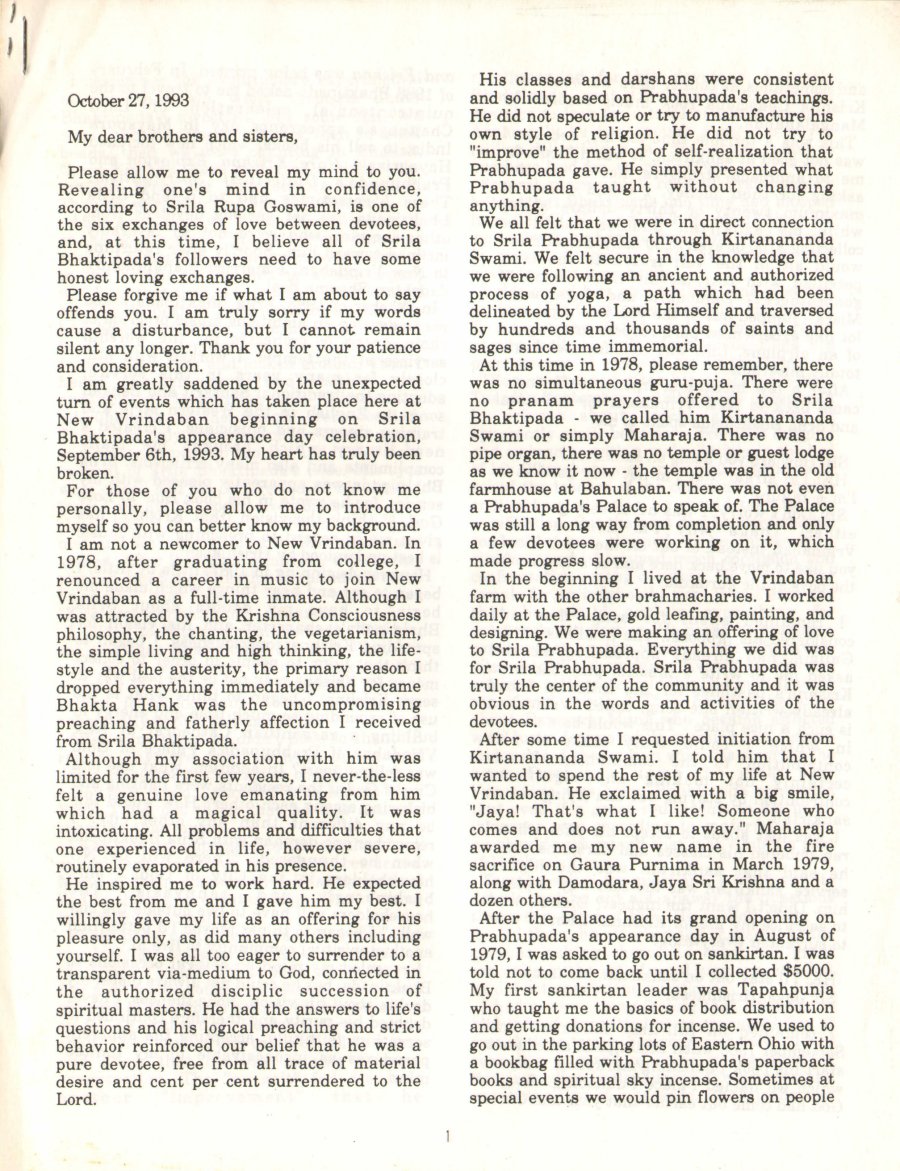
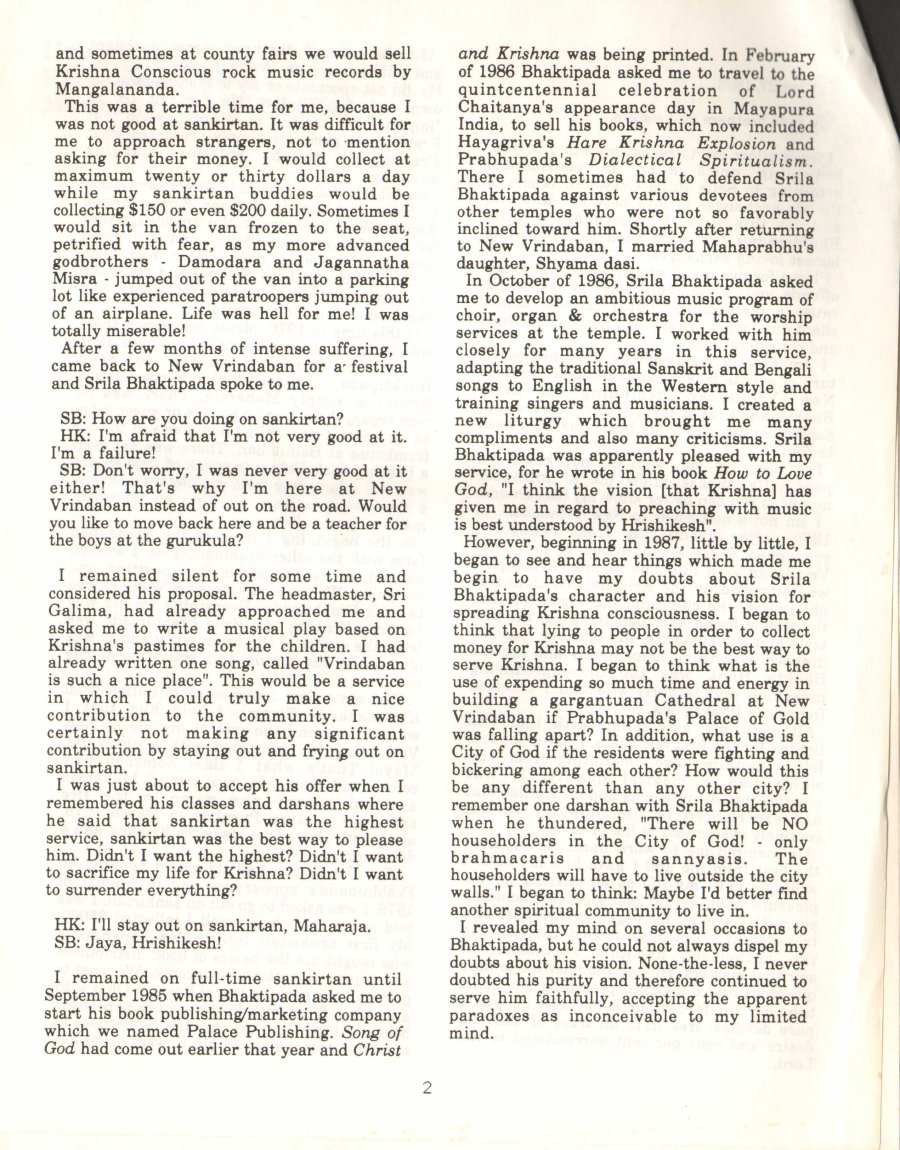
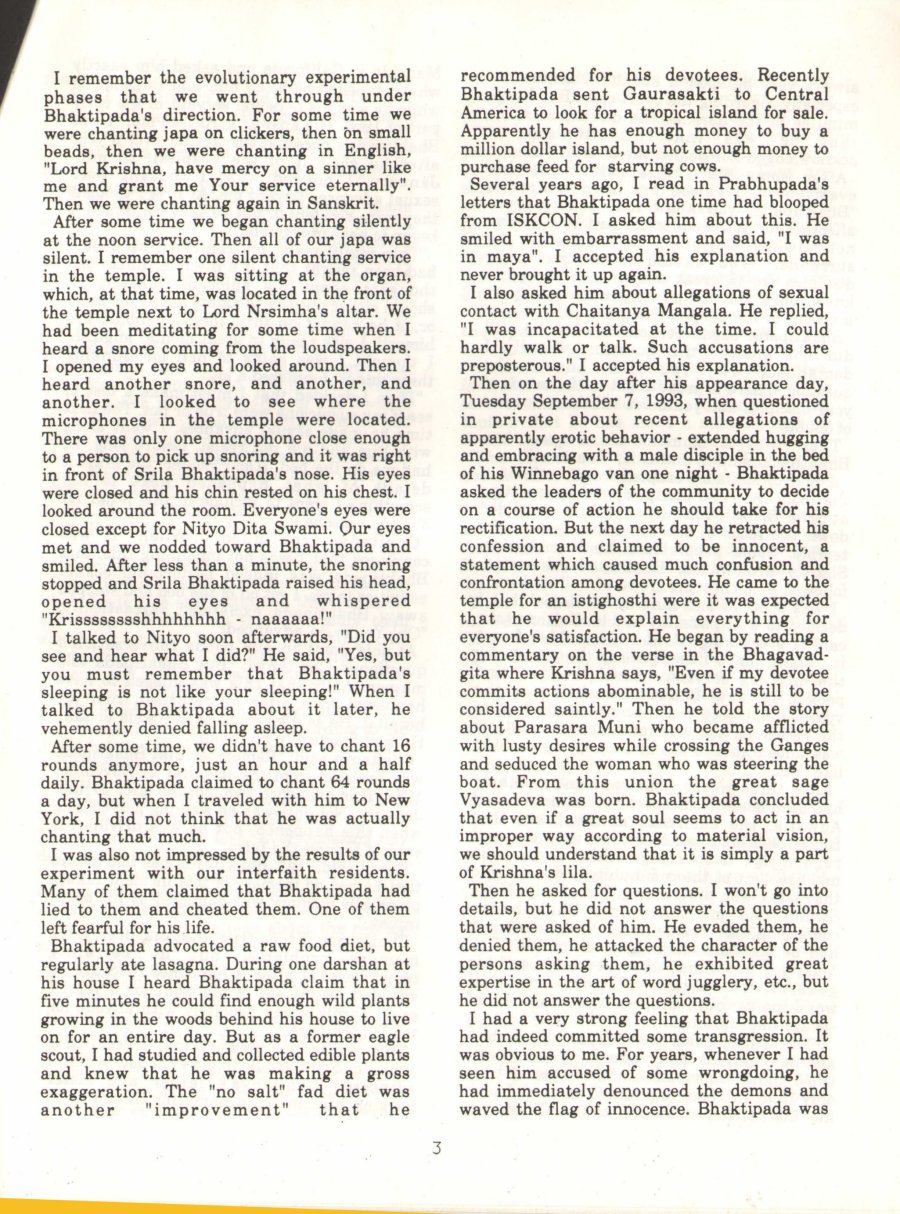
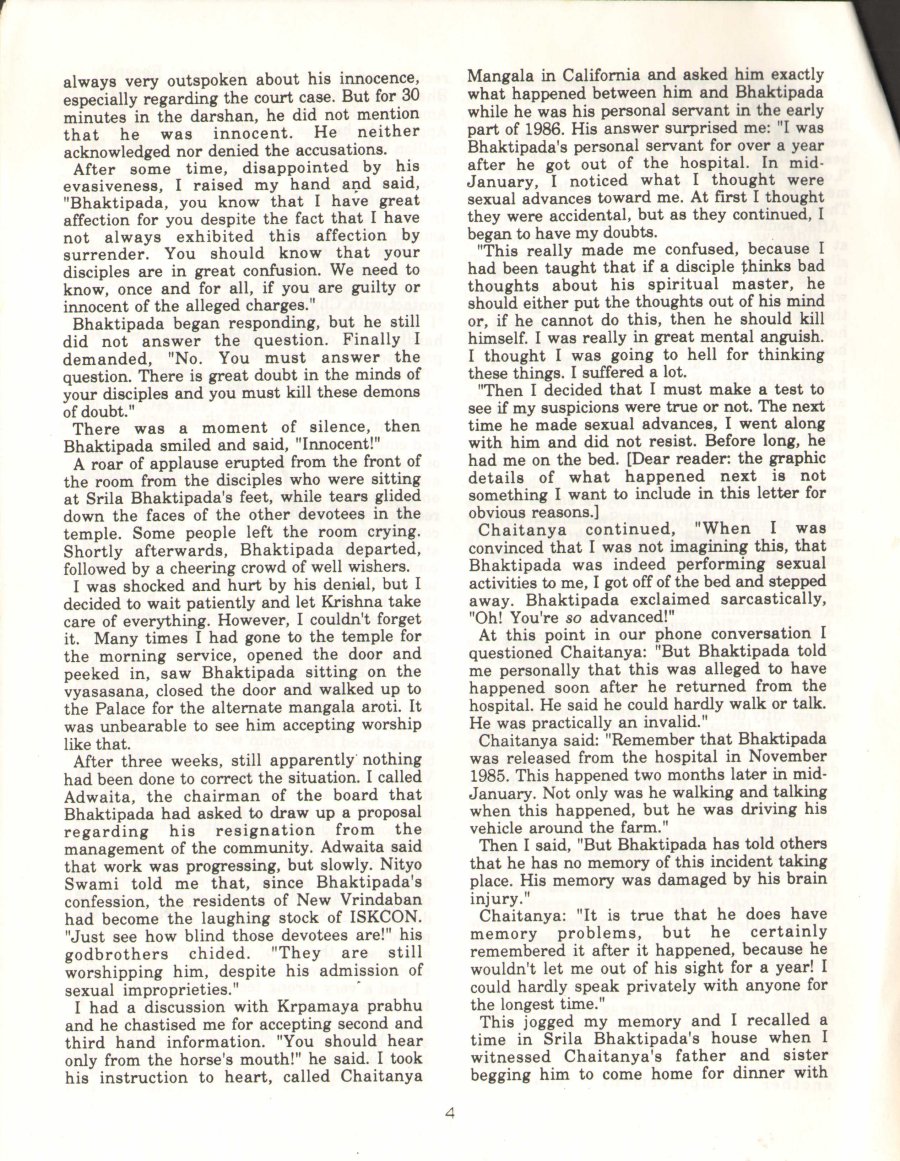
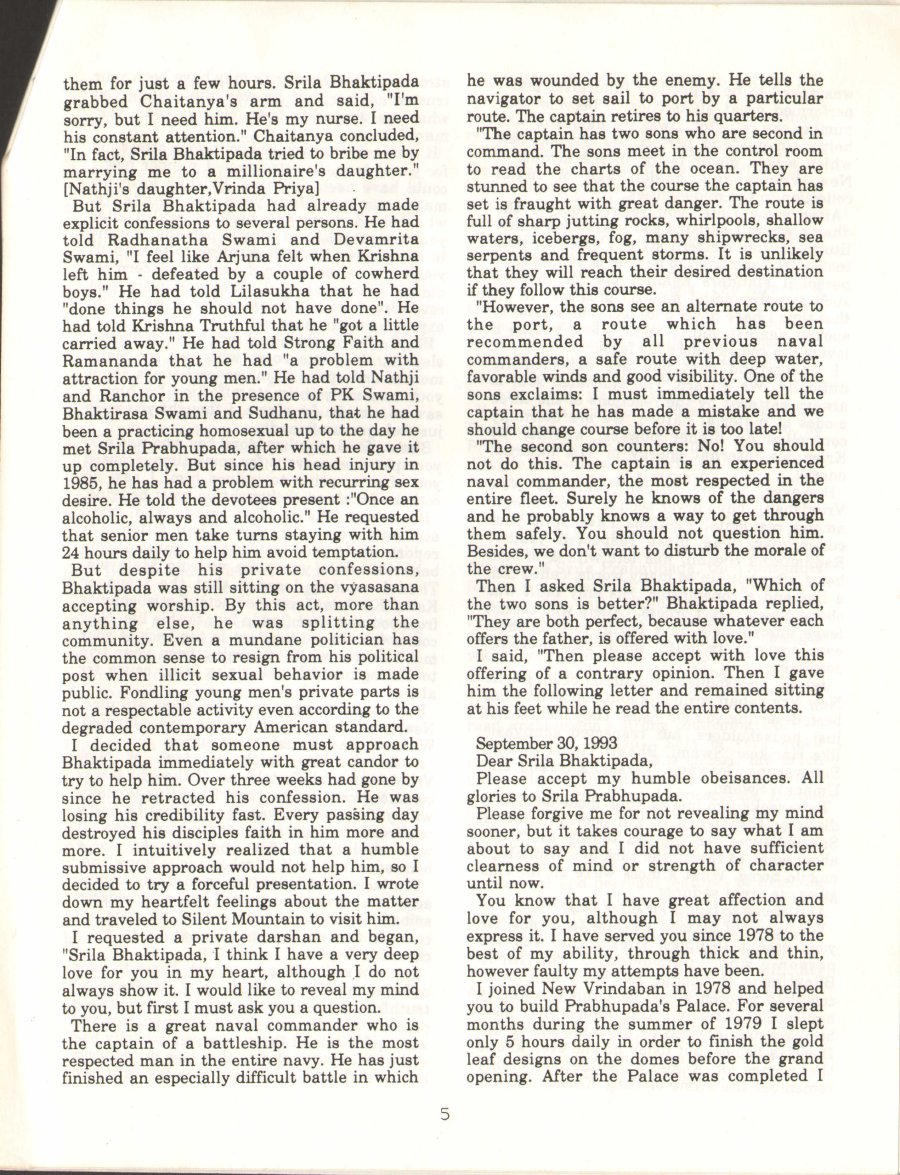
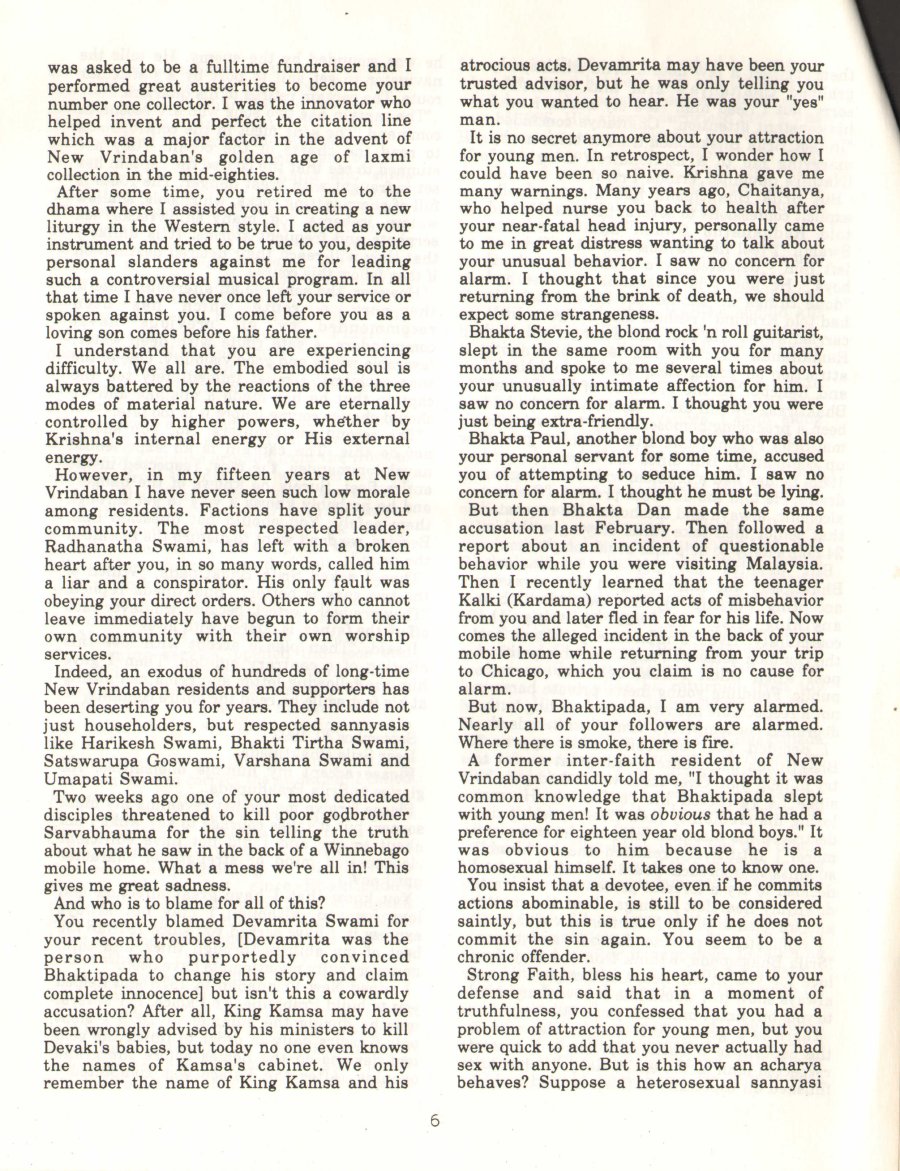
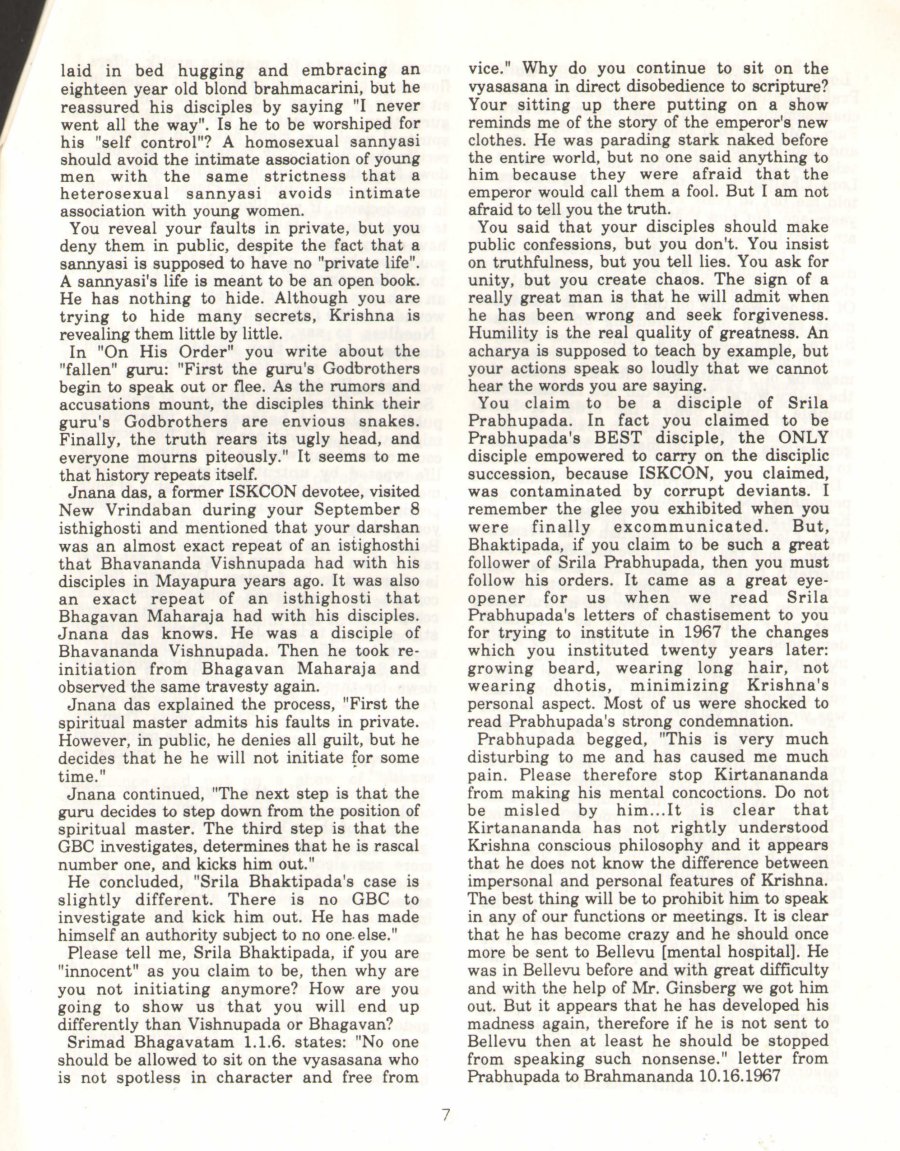
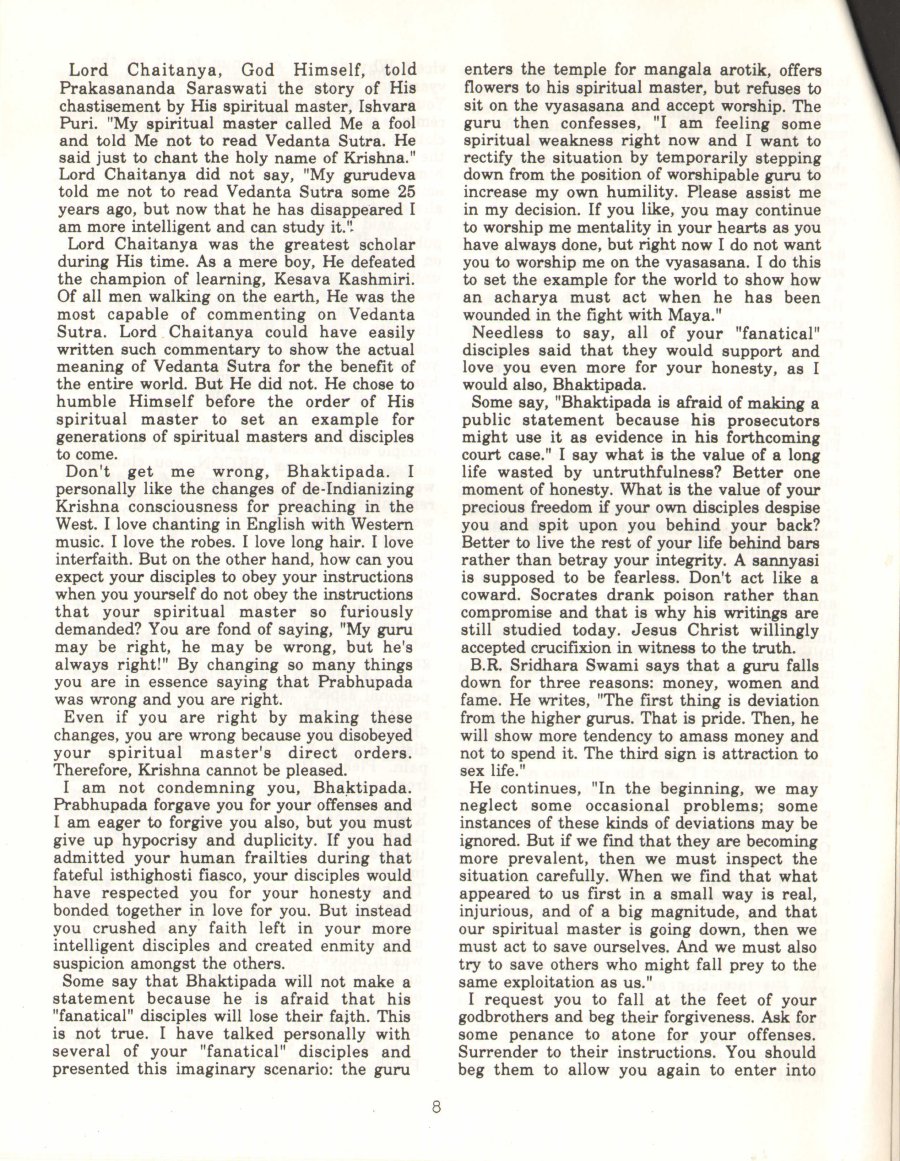
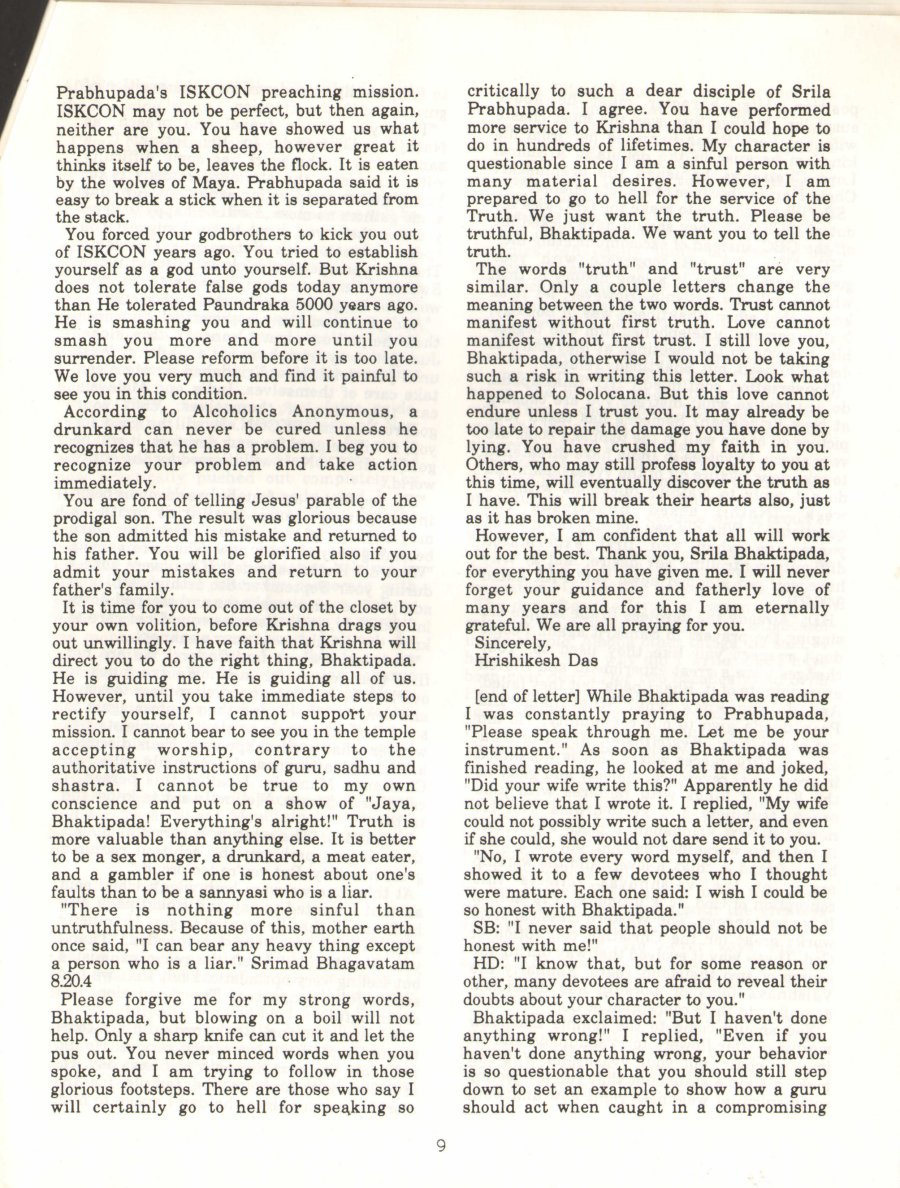
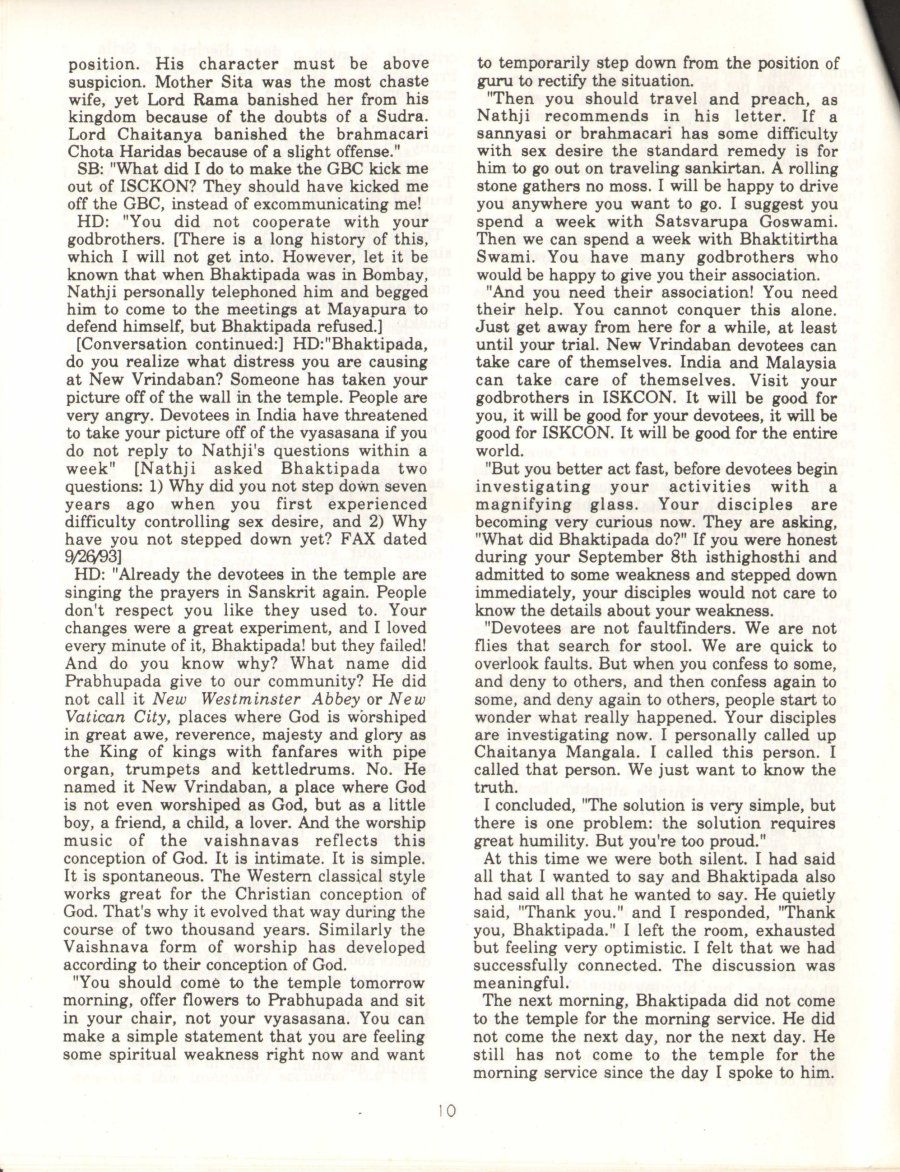
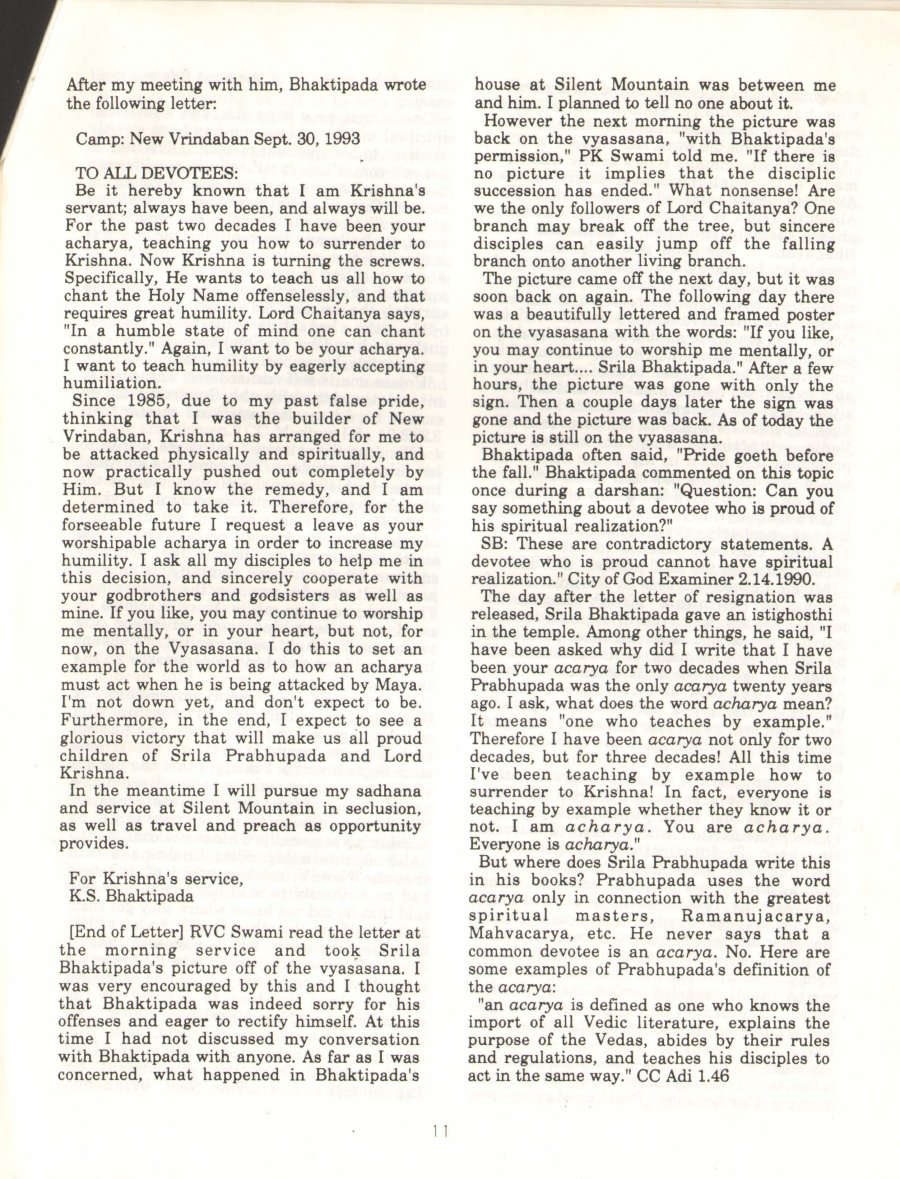
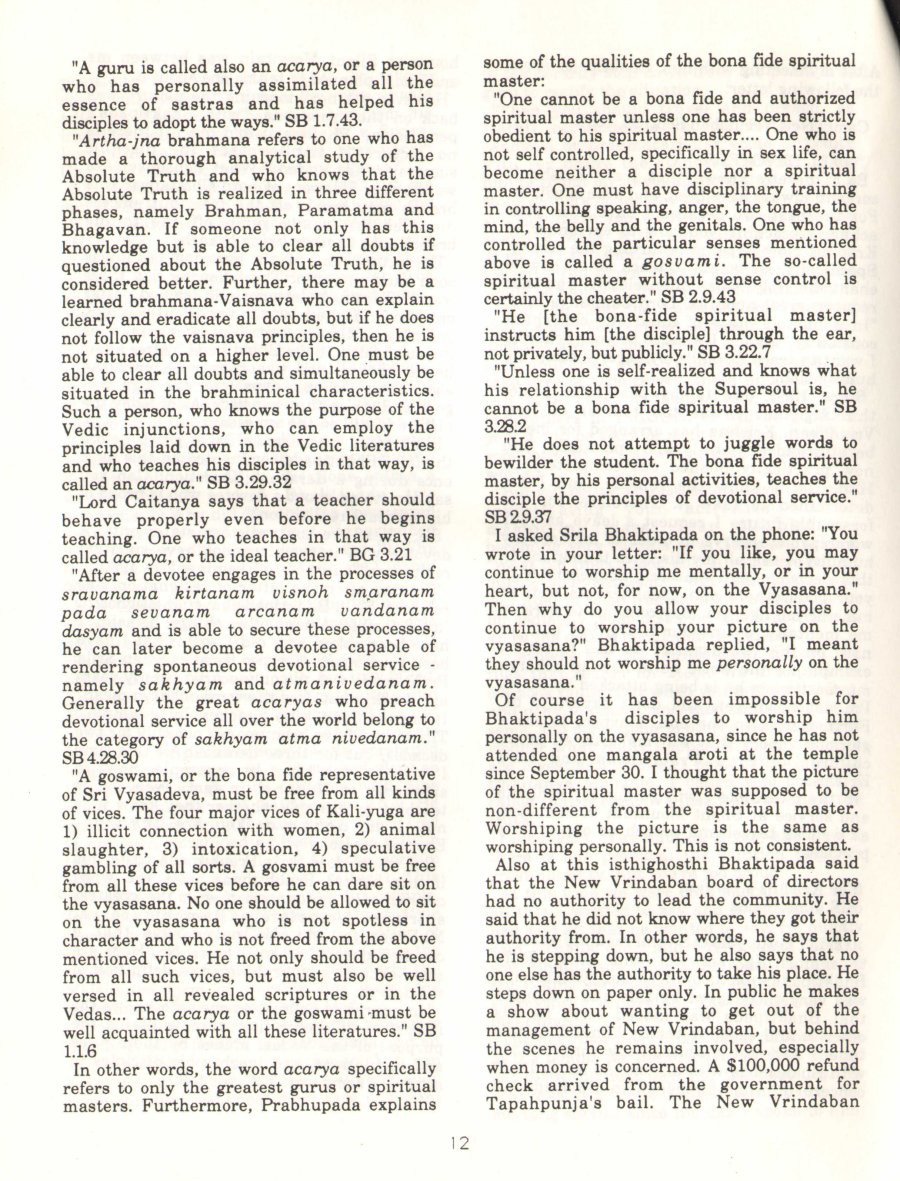
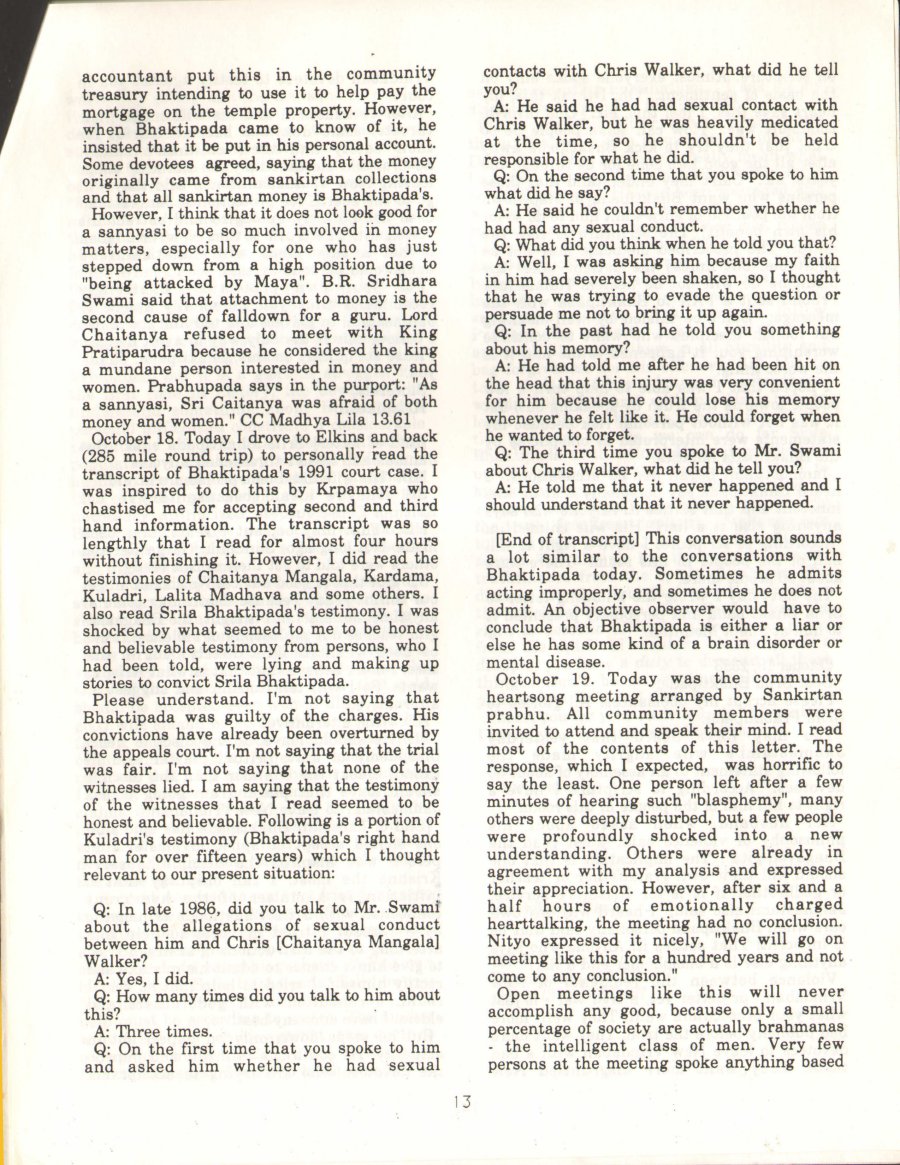
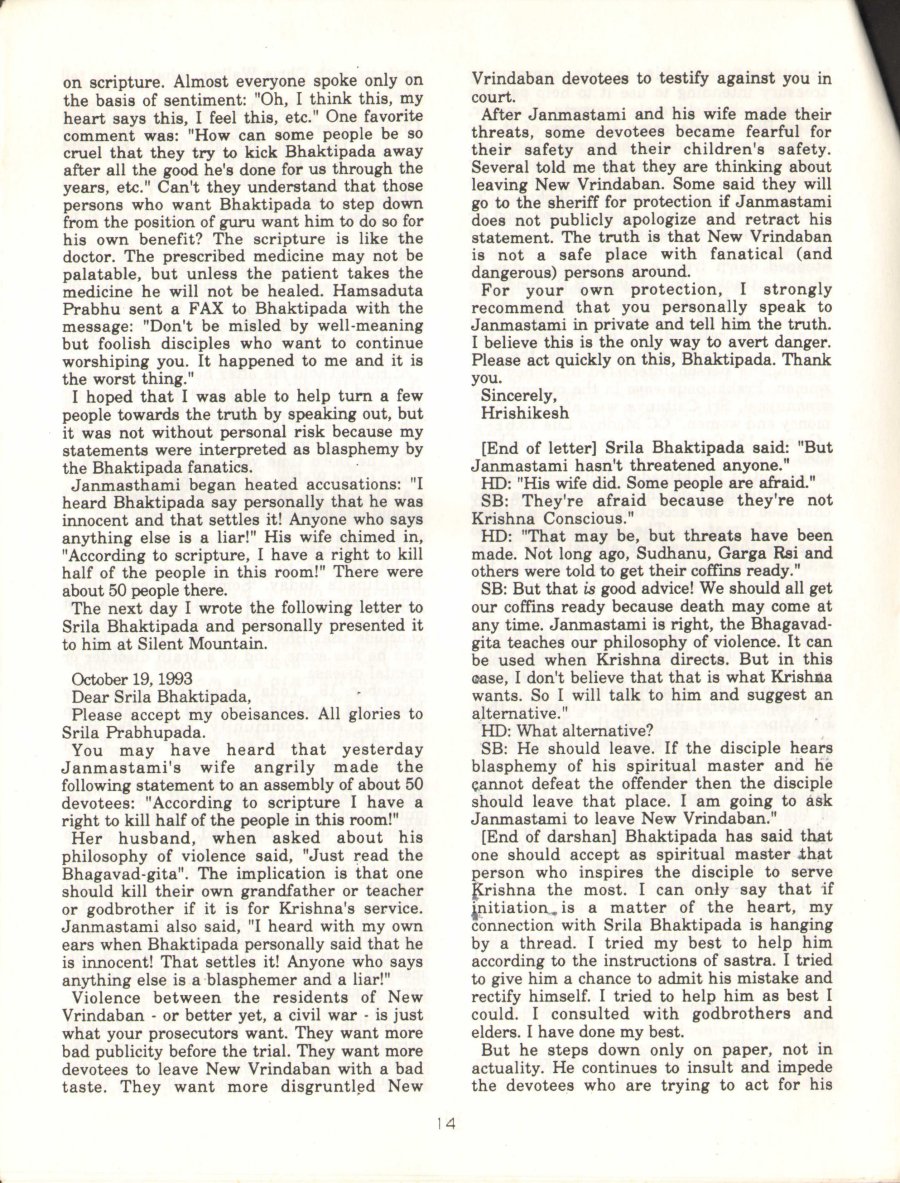
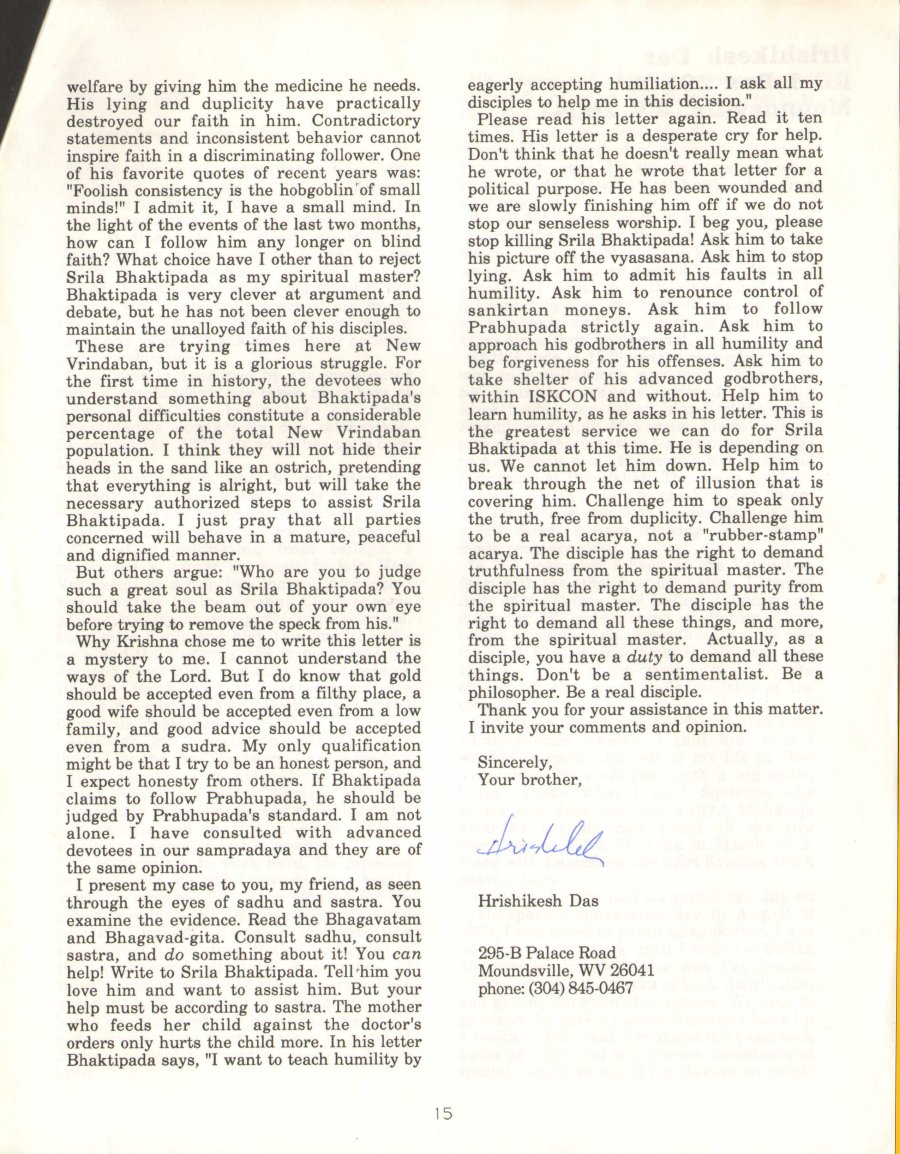
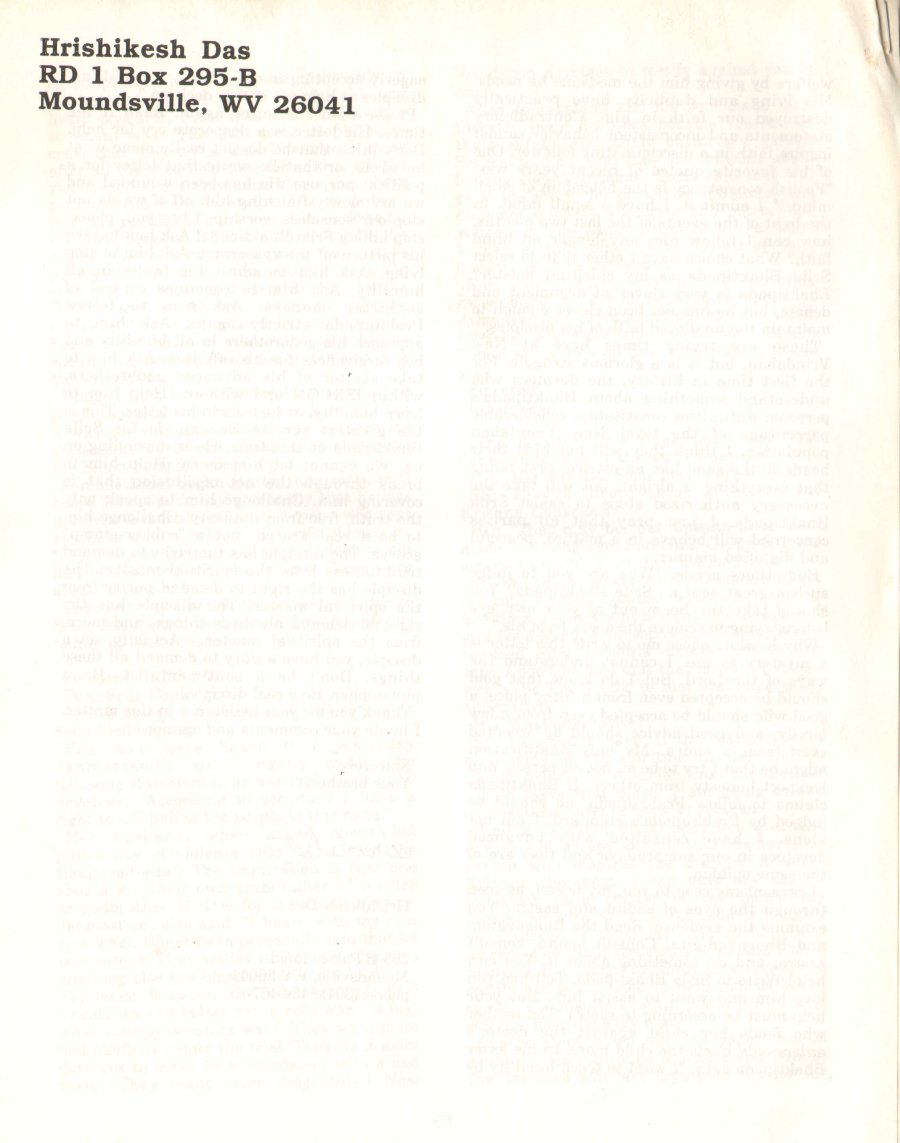
| Back to: Gold, Guns and God, Vol. 9 |